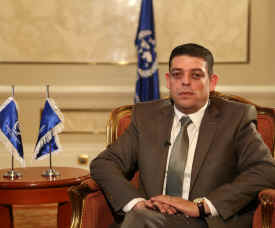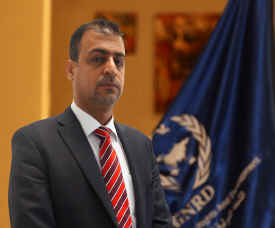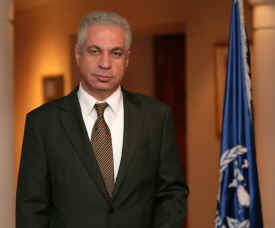Britons missing in Qatar
The Emirati connection
4 Sept 2014: Two British men have been reported missing after travelling to Qatar to investigate the treatment of Nepalese migrant workers there. The assumption is that the Qatari authorities did not like what they were doing, and arrested them.
Migrant workers in Qatar, especially in the construction industry, often live and work in appalling conditions, and this certainly deserves to be investigated. But there may be more to the men's disappearance than meets the eye. It seems possible they have become caught up in a squabble between Qatar and the United Arab Emirates.
Krishna Upadhyaya, 52, and Gundev Ghimire, 36, were working for the Global Network for Rights and Development (GNRD) which is based in Norway and has offices in Belgium, Switzerland, Spain, Sudan, Jordan and the UAE.

GNRD was established in 2008 "to enhance and support both human rights and development by adopting new strategies and policies for real change". It claims to be "a neutral and impartial organisation". Fifteen of its staff are accredited for access to the European Parliament. [Update: the number has since been reduced to six.] It has an annual budget of 3.5 million Euros, almost all of which comes from unspecified donations.
GNRD issues reports and press releases about a wide range of issues and countries, but some of these raise questions about how "neutral and impartial" it really is. It has been critical of Qatar (and rightly so) but it seems to have a remarkably soft spot for the UAE.
A search of its website reveals several enthusiastic reports about the UAE's achievements. One enthuses about the role of women in the UAE. One talks about the UAE's "achievements in the field of promoting and protecting the family and its members". Others praise the UAE for its environmental efforts, for the way it cares for the disabled and protects the rights of children.
GNRD also compiles a global human rights league table (IHRRI) which it describes as the "most trustful and complete international human rights rank indicator".
Its league table currently ranks the UAE in 13th position worldwide, just one place behind the UK and far ahead of any other Arab country – a point which the Emirati newspaper The National was quick to note. Qatar, incidentally, is ranked in 90th position.
Given this background, it would not be very surprising if the Qatari authorities assumed – rightly or wrongly – that GNRD's investigation had some political motive behind it.
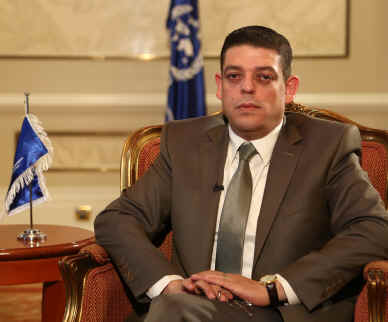
Loai Mohammed Deeb: ran a university from his home
An odd organisation
The Global Network for Rights and Development
6 Sept 2014: The Scandinavian University, established in Norway in 2007 and closed three years later, boasted of having 175 professors and more than 300 lecturers, plus a wide range of courses stretching from engineering and economics to sharia and Islamic Studies. How many students it had remains a complete mystery.
Oddly, the headquarters of this university were a single-storey building in Stavanger (see photograph) which also served as the home of Loai Mohammed Deeb, a lawyer of Palestinian origin, and documents filed with the authorities showed that despite the claims of a large teaching staff it had no employees at all.
The Norwegian education ministry became concerned that potential students could be misled into thinking it was an accredited institution. In 2010, threatened with legal action if he continued using the name "university", Deeb announced that the building in Stavanger was only the administrative office and he would shortly be moving it to the Middle East.
Interviewed by Aftenposten newspaper, he said the 175 professors, etc, were "at our department in the Middle East" but there is no evidence that they ever existed. The archived remains of the university's website can be found here in Arabic (and here in English via Google Translate).
A busy man
Despite the collapse of his Scandinavian University venture, however, Deeb had plenty of other things to keep him busy. He was co-founder (along with the Syrian Haytham Manna) of the Scandinavian Institute for Human Rights which aimed to "disseminate the culture of human rights, especially in the Middle East". He was also president of the Global Network for Rights and Development (GNRD), and executive director of the International Coalition against War Criminals (ICAWC).
In 2012, during a UN discussion on granting consultative status to various NGOs, Israel's delegate noted that Deeb had been answering questions on behalf of all these organisations and wondered about the connection between them and "how one individual could manage all three groups".
Deeb has also spoken at the UN Human Rights Council on behalf of the Maarij Foundation for Peace and Development.
In 2009, Deeb joined a group of Norwegian lawyers attempting to bring war crimes charges against three Israeli politicians – Ehud Olmert, Tzipi Livni and Ehud Barak – together with seven Israeli military commanders.
Britons missing in Qatar
But it is Deeb's role in the Global Network for Rights and Development that is of most interest at the moment. Last weekend, two British men working for GNRD went missing in Qatar, and the assumption (still not confirmed) is that they were arrested by the authorities.
The men, Krishna Upadhyaya and Ghimire Gundev, are said to have gone to Qatar to investigate the conditions of Nepalese migrant workers there – an issue that has been causing international concern.
Upadhyaya, originally from Nepal, is described by the Guardian as "an experienced human rights researcher and worked for Anti-Slavery International for almost 12 years".
While it's possible the men were arrested because Qatar wanted to suppress their findings, it's also possible (and perhaps more likely) that they became unwittingly caught up in a squabble between Qatar and the United Arab Emirates in which their employer, GNRD, is suspected by the Qataris of playing a part.
Alastair Sloan points out in a blog post that the UAE and Qatar are currently engaged in "an unprecedented row over support for the Muslim Brotherhood, with UAE strongly opposed to them and Qatar strongly in favour". Sloan adds that there have been tit-for-tat arguments going on for months and that the UAE recently arrested two Qatari nationals on spying charges. The arrests of Upadhyaya and Gundev (if that is what happened) may have been intended as a reprisal for that.
Also linked to the Qatari-Emirati feud and the question of the Muslim Brotherhood, a UAE newspaper, The National, published a lengthy investigation last June into "individuals and organisations in London with connections to the Muslim Brotherhood" which it said were "behind a series of media attacks on the UAE" (see earlier blog post).
In a self-righteous editorial about this, The National said: "The UAE conducts its domestic and foreign policy openly, not in secret. The least we should expect is that our critics are similarly open about their motivations, sympathies and sources of funding."
Questions of funding
The Global Network for Rights and Development is a fairly obscure organisation and before the incident in Qatar its activities had been largely unnoticed by the media. Nevertheless, it has offices in Norway, Belgium, Switzerland, Spain, Sudan, Jordan and the UAE. It is well funded – to the tune of 3.5 million euros a year – and has an astonishing 1.14 million followers on Twitter. This is extraordinary considering that it has posted only 359 tweets, and a check via the Social Bakers website suggests almost all its apparent followers are fakes.
GNRD says most of its funding comes from donations, and its website includes the logos of five "sponsors" who presumably provide at least some of this money.
The first of these sponsors is an Emirates-based business called Deeb Consulting and the company's website says its sole proprietor is Loai Mohammed Deeb.
It is difficult to identify the four other sponsors since no details are given – only the logos. The logos say "Advance Security Technology", "Kaoud Law", "My Dream" (with the words transliterated into Russian beneath) and "Action Design". Attempts to trace these companies through a Google image search have so far drawn a blank. [Update: these logos have since been deleted from GNRD's website.]
 |
 |
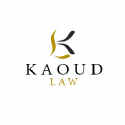 |
 |
 |
GNRD appears to be active in and around various UN forums and is also registered with the European Parliament for lobbying purposes (fifteen of its staff have official accreditation). According to a recent statement on GNRD's website, it "has fought zealously, both in Brussels and at the United Nations, to improve workers' rights in Qatar, and eliminate forced labour through the sponsorship system".
Exploitation of migrant workers is a major problem in the Arab Gulf states, including the UAE, but GNRD's campaigning has focused particularly on Qatar. There is no word on its website, for example, about the mass expulsions of migrants from Saudi Arabia during the last year-and-a-half. In fact, a search of GNRD's website reveals nothing that is critical of Saudi Arabia, though one item reports that "Saudi Arabia is particularly keen on cooperating with the UAE to develop renewable energy and clean technology in the Gulf region."
Election monitoring
GNRD has also done election monitoring in Algeria, Jordan and Egypt.
In Algeria last April, President Abdelaziz Bouteflika was re-elected for a fourth five-year term with more than 80% of the votes, despite his serious ill-health. GNRD's report was broadly favourable, saying the election was "generally conducted in a free and fair manner", though it highlighted seven areas where "electoral procedure can be improved in future".
Its report of Jordan's parliamentary elections last year was considerably more critical. Among other things, it called for revision of the kingdom's electoral law since large numbers of voters "decided not to participate in the election as they felt that the present law would not leave them with a fair representation". It also recommended "a thorough investigation as regards the unexplained circulation of money inside in the polling rooms".
On the other hand, this year's presidential election in Egypt which legitimised General Sisi's seizure of power was greeted with much praise from GNRD and two other organisations (Maat for Peace Development and Human Rights, and the International Institute for Peace Justice and Human Rights) which had been monitoring the election jointly.
Their report said "the Egyptian people have experienced a unique process toward democratic transition, and despite the fact that minor errors and inaccuracies occurred, these do not shed a negative light on the overall results of the electoral process". It continued:
"The Joint Mission was honoured to be a part of the 2014 Egyptian Presidential Election and contribute to promoting its transparency, integrity, and success. The Joint Mission expresses its hope that these contributions will support Egypt’s development and a smooth transition to democracy. We wish success to Egypt, being one of the most influential countries in the Middle East, and commend their achievements thus far towards a path to democracy."
GNRD and the Emirates
But the aspect of GNRD's work that raises most eyebrows is its relationship with the UAE.
GNRD produces an international league table of human rights which currently (and rather incredibly) ranks the UAE in 14th position worldwide – just one place behind the UK and far ahead of any other Arab country. Articles on GNRD's website also portray the UAE's human rights record in a highly positive light. One article comments favourably on the role of women in the UAE. Others talk about the UAE's "achievements in the field of promoting and protecting the family and its members", also praising the UAE for its environmental efforts, and for the way it cares for the disabled and protects the rights of children.
This glowing picture is not one that many others share. The US State Department, for instance, said of the UAE in its most recent annual report:
"The emirates are under patriarchal rule with political allegiance defined by loyalty to tribal leaders, leaders of the individual emirates, and leaders of the federation. There are limited democratically elected institutions, but no political parties ...
"The three most significant human rights problems [during 2013] were citizens’ inability to change their government; limitations on citizens’ civil liberties (including the freedoms of speech, press, assembly, association, and internet use); and arbitrary arrests, incommunicado detentions, and lengthy pretrial detentions."
Similarly, Human Rights Watch, in its latest World Report, said:
"The United Arab Emirates continues to crack down on freedom of expression and association. The authorities are arbitrarily detaining scores of individuals they suspect of links to domestic and international Islamist groups. A court convicted 69 dissidents in July after a manifestly unfair trial, in which evidence emerged of systematic torture at state security facilities.
"The UAE made no reforms to a system that facilitates the forced labour of migrant workers. Plans to ameliorate conditions for female domestic workers fall short of the standards outlined in the convention on domestic workers that the International Labour Organisation adopted in 2012."
Although GNRD maintains an office in the UAE, civil society organisations in general are not particularly welcomed by the authorities there. All associations and NGOs have to register with the Ministry of Social Affairs and, according to the US State Department, they have to follow the government’s censorship guidelines and receive prior government approval before publishing any material.
GNRD, since it is based in Norway, may not be covered by these local rules but foreign-based organisations have also run into trouble in the UAE. In 2012, Emirati authorities abruptly closed the Dubai office of the National Democratic Institute (an American NGO) and two of its staff were briefly detained. On the same day, the polling organisation Gallup and the German Konrad Adenauer Foundation also closed their offices in Abu Dhabi – apparently at the government's behest.
All this raises a lot of questions about GNRD and its claim to be "neutral and impartial". It does not, of course, justify Qatar's detention of two GNRD employees (if that is indeed what happened) but it does complicate efforts to secure their release.
UPDATE, 7 September 2014: Qatar's foreign ministry has now confirmed that the two Britons have been arrested and "are under investigation for violating the law of the land," al-Jazeera reports.
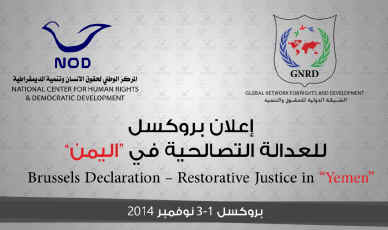
Fake university man aims to sort out Yemen
UAE-linked group organises reconciliation effort
30 Oct 2014: A controversial NGO headed by a man who once ran a fake university in Norway is playing a central role in efforts to solve Yemen's political crisis.
The Global Network for Rights and Development (GNRD), together with Yemen's National Center for Human Rights and Democratic Development (NCHRDD), has organised a "restorative justice" conference in Brussels which apparently will be attended by prominent Yemeni figures. A press release issued by GNRD says:
"The Conference will take place over three days from Saturday 1st to Monday 3rd of November and will bring together the most influential policy makers from all political positions and seek to negotiate a road map for peace and reconciliation that was prepared by GNRD and NCHRDD. The conference will aim to promote constructive dialogue to put an end to political gridlock and work for greater security, stability, and development for the future Yemen.
"Participants will include top Yemeni government officials and heads of political parties, such as Dr Ahmed Bin-Daghir, Deputy Prime Minister; Mr. Sultan Albarkani, Abdullah Al-Akwa, the Minister of Energy: Head of the General People's Congress party at the Yemeni Parliament. Leaders from the Islah (Islamic) Party, Ansar Allah, Al-Rashad party, Al-Haq party, Al-Nasri party, Yemeni Southern Movement, Social Arab Baath Party and the Yemeni Social Party will also be in attendance. The conference will bring together Yemeni civil society representatives, think tanks, conflict resolution and human rights experts."
In comments reported by Yemen's official news agency, Saba, GNRD's president, Loai Deeb, described the conference as "a real opportunity to achieve an all-inclusive national reconciliation". According to Saba, the French ambassador in Yemen has also declared his support for it.
GNRD is an obscure but well-funded organisation (to the tune of 3.5 million euros a year) and has offices in Norway, Belgium, Switzerland, Spain, Sudan, Jordan and the UAE. It appears to be active in and around various UN forums and is also registered with the European Parliament for lobbying purposes (fifteen of its staff have official accreditation).
GNRD says most of its funding comes from donations, and its website includes the logos of five "sponsors" who presumably provide at least some of this money.
The first of these sponsors is an Emirates-based business called Deeb Consulting and the company's website says its sole proprietor is GNRD's president, Loai Deeb. Attempts to identify the four other sponsors from their logos have so far drawn a blank.
 |
 |
 |
 |
 |
GNRD is fortunate to have an office in the UAE, since civil society organisations are not particularly welcomed by the authorities there. All associations and NGOs in the UAE have to register with the Ministry of Social Affairs and, according to the US State Department, they have to follow the government’s censorship guidelines and receive prior government approval before publishing any material.
In 2012, Emirati authorities abruptly closed the Dubai office of the National Democratic Institute (an American NGO) and two of its staff were briefly detained. On the same day, the polling organisation Gallup and the German Konrad Adenauer Foundation also closed their offices in Abu Dhabi – apparently at the government's behest.
GNRD produces an international league table of human rights which currently (and rather incredibly) ranks the UAE in 14th position worldwide – one place ahead of the UK and far ahead of any other Arab country. Articles on GNRD's website also portray the UAE's human rights record in a highly positive light. One article comments favourably on the role of women in the UAE. Others talk about the UAE's "achievements in the field of promoting and protecting the family and its members", also praising the UAE for its environmental efforts, and for the way it cares for the disabled and protects the rights of children.
Others, including the US State Department and Human Rights Watch, are far more critical of the UAE's record.
Earlier this year, working jointly with two other organisations, GNRD monitored the presidential election in Egypt which legitimised the seizure of power by General Sisi (who happens to be backed by the UAE) – and its report on the election was surprisingly enthusiastic:
"The Egyptian people have experienced a unique process toward democratic transition, and despite the fact that minor errors and inaccuracies occurred, these do not shed a negative light on the overall results of the electoral process ...
"The Joint Mission was honoured to be a part of the 2014 Egyptian Presidential Election and contribute to promoting its transparency, integrity, and success. The Joint Mission expresses its hope that these contributions will support Egypt’s development and a smooth transition to democracy. We wish success to Egypt, being one of the most influential countries in the Middle East, and commend their achievements thus far towards a path to democracy."
GNRD attracted media attention early last September when it sent a researcher and photographer to Qatar to investigate the treatment of Nepalese migrant workers there. The pair were arrested as they were about to return home but were eventually released without charges. It is thought the Qatari authorities – who were in the midst of a political spat with the UAE – may have been suspicious of GNRD's Emirati connections. Publication of the report on Nepalese workers is still awaited.
At the time, it was noted that GNRD's Twitter account had 1.14 million followers – an unbelievable number considering it had posted only 359 tweets. Following public speculation about this it has since shed around 130,000 followers.
In 2007, before becoming president of GNRD, Loai Deeb established "The Scandinavian University" in Norway. It boasted of having 175 professors and more than 300 lecturers, plus a wide range of courses stretching from engineering and economics to sharia and Islamic Studies, but there is no evidence that anyone ever studied there.
The university's headquarters were a single-storey building in Stavanger (see photograph) which also served as Deeb's home, and documents filed with the Norwegian authorities showed that despite the claims of a large teaching staff it had no employees at all.
The Norwegian education ministry became concerned that potential students could be misled into thinking "The Scandinavian University" was an accredited institution and, under the threat of legal action, Deeb closed it down.
It remains to be seen if Deeb will have any more success in his effort to sort out Yemen.
Fake university chief to monitor Egypt's elections
Sisi regime approves controversial NGO
28 Jan 2015: A controversial NGO headed by a man who once ran a fake university from his home has been appointed to monitor Egypt's forthcoming parliamentary elections.
The Global Network for Rights and Development (GNRD), which has strong links with the UAE, is one of only five international organisations chosen by the Supreme Electoral Commission to monitor the Egyptian polls which begin in March.
GNRD seems to have been fortunate in securing this opportunity because the electoral commission allowed only a very short period (January 12-20) for organisations interested in monitoring to apply. The Cairo Post reports: "Many NGOs lamented the limited time available for them to finish required papers to register for monitoring."
Some of the better-known international monitoring organisations had already said they would not take part. Last October, for example, The Carter Center announced that it had closed its field office in Egypt and would not be sending election observers:
"This decision reflects The Carter Center's assessment that the political environment is deeply polarised and that political space has narrowed for Egyptian political parties, civil society, and the media.
"As a result, the upcoming elections are unlikely to advance a genuine democratic transition in Egypt. Both Egyptian civil society and international organisations face an increasingly restrictive environment that hinders their ability to conduct credible election observation."
That hasn't deterred GNRD, however. Last year it took part in a joint mission monitoring the presidential election which legitimised General Sisi's seizure of power – and produced an enthusiastic report.
It said: "the Egyptian people have experienced a unique process toward democratic transition, and despite the fact that minor errors and inaccuracies occurred, these do not shed a negative light on the overall results of the electoral process". It continued:
"The Joint Mission was honoured to be a part of the 2014 Egyptian Presidential Election and contribute to promoting its transparency, integrity, and success. The Joint Mission expresses its hope that these contributions will support Egypt’s development and a smooth transition to democracy. We wish success to Egypt, being one of the most influential countries in the Middle East, and commend their achievements thus far towards a path to democracy."
For the presidential election GNRD was working in partnership with Maat for Peace Development and Human Rights (an Egyptian NGO) and the International Institute for Peace Justice and Human Rights (based in Geneva). These three will be working together again to monitor the parliamentary elections, according to Daily News Egypt. The other international NGOs with monitoring permits are the International Institute for Democracy (Sweden), the Electoral Institute for Sustainable Democracy in Africa (based in South Africa) and the Ecumenical Alliance for Human Rights and Development (Switzerland).
The 'Scandinavian University' affair
The president of GNRD is Loai Deeb, a lawyer who previously ran "The Scandinavian University", a bogus educational institution in Norway. It boasted of having 175 professors and more than 300 lecturers, plus a wide range of courses stretching from engineering and economics to sharia and Islamic Studies, but there is no evidence that anyone ever studied there.
The university's headquarters were a single-storey building in Stavanger (see photograph) which also served as Deeb's home, and documents filed with the Norwegian authorities showed that despite the claims of a large teaching staff it had no employees at all.
The Norwegian education ministry became concerned that potential students could be misled into thinking "The Scandinavian University" was an accredited institution and, under the threat of legal action, Deeb closed it down. (More details here.)
Emirati connections
GNRD itself is an obscure but well-funded organisation (to the tune of 3.5 million euros a year) and has offices in Norway, Belgium, Switzerland, Spain, Sudan, Jordan and the UAE. It appears to be active in and around various UN forums and is also registered with the European Parliament for lobbying purposes (fifteen of its staff have official accreditation).
GNRD says most of its funding comes from donations, though the sources of money are far from transparent. On its website, at the bottom of the home page, GNRD has a section headed "Our collaborators and sponsors" with a collection of sixteen logos, some of which are illegible. It is unclear which of these actually donate money but the website says GNRD's "main sponsor" is the GNRD Foundation. In other words, GNRD seems to be sponsoring itself.
The GNRD Foundation (registered in Norway late last year) is a new sponsor on the website and replaces a previous sponsor, Deeb Consulting – an Emirates-based company owned by Loai Deeb.
GNRD has good connections with the UAE, which is one of the Gulf states bankrolling the Sisi regime in Egypt. GNRD is particularly fortunate to have an office in the UAE, since civil society organisations are not generally welcomed by the authorities there. All associations and NGOs in the UAE have to register with the Ministry of Social Affairs and, according to the US State Department, they have to follow the government’s censorship guidelines and receive prior government approval before publishing any material.
In 2012, Emirati authorities abruptly closed the Dubai office of the National Democratic Institute (an American NGO) and two of its staff were briefly detained. On the same day, the polling organisation Gallup and the German Konrad Adenauer Foundation also closed their offices in Abu Dhabi – apparently at the government's behest.
GNRD produces an international league table of human rights and the most recent one (rather incredibly) ranked the UAE in 14th position worldwide – just one place behind the UK and far ahead of any other Arab country. Following criticism in social media, that league table has now been deleted, though another one is promised in 92 days.
Articles on GNRD's website also portray the UAE's human rights record in a highly positive light. One article comments favourably on the role of women in the UAE. Others talk about the UAE's "achievements in the field of promoting and protecting the family and its members", also praising the UAE for its environmental efforts, and for the way it cares for the disabled and protects the rights of children.
This glowing picture is not one that many others share. The US State Department and Human Rights Watch, for instance, have both been far more critical of the UAE's rights record.
Last August, during a political spat between the UAE and Qatar, Qatar arrested two British men who had gone there on behalf of GNRD to investigate the conditions of Nepalese migrant workers. The pair were eventually released without charges but their report on migrant workers has so far not been published.
Election monitoring in Egypt
International monitoring of elections in Egypt is a fairly recent development. The Mubarak regime objected to it on the grounds that it would be an infringement of national sovereignty, and insisted that the polls could be adequately monitored by Egyptian judges.
The Sisi regime, on the other hand, seems to have recognised that monitoring can have PR value, so long as it doesn't get out of control and become too critical. In addition to the five foreign NGOs, 63 local organisations will be engaged in monitoring the parliamentary election.
However, the Supreme Electoral Commission has issued some restrictive rules for monitors. One, noted by Daily News Egypt, says observers cannot spend more than half an hour inside polling stations. The rules also allow judges presiding over polling stations to eject or refuse entry to observers if they thing their presence "could obstruct the electoral process".
Egypt election monitoring scandal
Sisi regime approves "duplicate" NGOs
29 Jan 2015: Earlier this week the Sisi regime announced that it had approved five international NGOs to monitor Egypt's parliamentary elections in March.
It has now emerged that this is not strictly true, because two of the five NGOs are appear to be the same organisation operating under different names.
In a blog post yesterday, I looked at one of the five approved organisations, the Global Network for Rights and Development (GNRD), which has a controversial history and is run by Loai Deeb, the former head of a fake university in Norway.
Another of the five regime-approved NGOs is the International Institute for Peace Justice and Human Rights (IIPJHR), based in Geneva.
It has been reported that GNRD and IIPJHR will be working together, along with Maat for Peace Development and Human Rights (an Egyptian NGO which appears to support the Sisi regime), to monitor the forthcoming elections. They previously worked together as a "joint mission" to monitor last year's presidential election in Egypt – and produced an enthusiastic report about it.
GNRD and IIPJHR both applied to monitor the parliamentary elections (during a very short window period for applications) and both were lucky enough to be successful. But are they really separate organisations? There are good reasons for believing they are not.
A look at press releases on IIPJHR's website shows that virtually all its activities are carried out in conjunction with GNRD.
IIPJHR's office address in Geneva is 1 Rue Richard Wagner, which – by a remarkable coincidence – is also the address of GNRD's Geneva office.
Even more remarkably, if you click on the "Who we are" section of IIPJHR's website, a page comes up which doesn't mention IIPJHR at all but begins: "The Global Network for Rights and Development (GNRD) is an International NGO established in June 2008 with the aim to enhance and support both human rights and development by adopting new strategies and policies for real change ..."
The same text can also be found in the "Who we are" section of GNRD's website.
Grand designs in Geneva
Controversial NGO aims to solve terrorism problem
9 Feb 2015: Last November various Yemeni political figures were flown to Brussels for a conference which had been hailed by its organisers as "a real opportunity to achieve an all-inclusive national reconciliation".
Since then, of course, the situation in Yemen has gone from bad to worse and it's difficult to see what the Brussels conference could have hoped to achieve beyond the self-aggrandisement of its organisers when so many other attempts at reconciliation had failed.
The Brussels conference was jointly organised by the Global Network for Rights and Development (GNRD) and Yemen's National Center for Human Rights and Democratic Development (NCHRDD).
GNRD is a controversial but well-funded organisation headed by Loai Deeb, a lawyer who previously ran a fake university in Norway. Meanwhile the head of NCHRDD, according to the Yemen Times, is Ahmed Saleh al-Essi who became controversial in Yemen both for his business activities and (until recently) his domination over the Yemeni Football Association.
In a press release at the end of the Brussels conference GNRD declared the event a success. Participants signed a document called the "Brussels Declaration for Yemeni National Reconciliation" and GNRD's vice-president, Abozer Elligai, promised that GNRD would follow through and ensure proper implementation of each provision in the declaration".
The press release gave no details of the document's content and the text has not been published on GNRD's website. However, Yasin al-Tamimi, a political analyst at the Yemeni government news agency described the Brussels agreement as "worthless in terms of its substance and content". He told the Yemen Times: "It contributed nothing to the Yemeni reconciliation process. We as a country didn't benefit from this meeting."
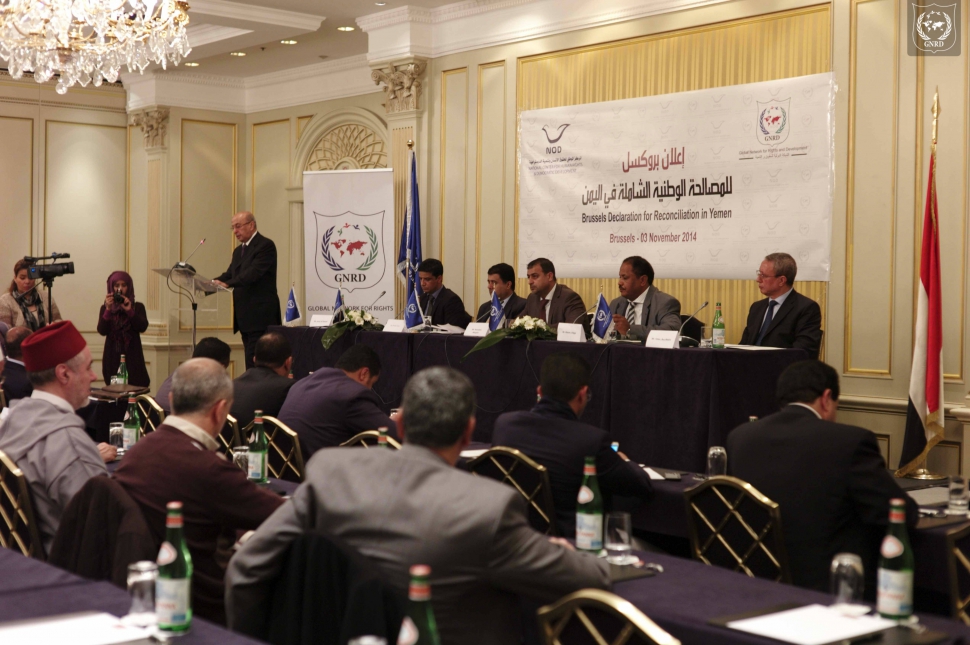
The Yemen conference in Brussels. Photo:GNRD
None of that augurs well for GNRD's latest venture, which is even more ambitious. On February 16 and 17 it is holding another conference – this time in Geneva – where "top government officials and other leaders from more than 40 countries" (according to the press release) will discuss a draft document which GNRD is calling the "International Convention on Balancing Counter-Terrorism and Human Rights".
In a video posted on YouTube (see above) Victoria Brannan, described as a legal researcher for GNRD, explains the background:
"Over a year ago the Global Network for Rights and Development launched an international initiative to combat terrorism and strike a balance in order to preserve human rights in the context of counterterrorism operations ...
"This international initiative was the result of an in-depth study by GNRD which focused on the changes that were occurring in the methods of practising terrrorism.
"Over the past year GNRD has consulted and communicated with all countries, as well as international and regional organisations. While GNRD has received a positive response from many countries, there are some countries that are suffering from the consequences of terrorism today that were unwilling to cooperate."
Referring to the plans for next week's conference, Ms Brannan continues:
"At this conference GNRD will put forward a comprehensive international convention to fight terrorism and strengthen pre-emptive prevention mechanisms. The conference will also detail the procedures for signing and joining this convention which aims to produce the 'Council for Countering Terrorism', an international body that enjoys authority and flexibility to deal with terrorism and eliminate it completely.
"Further, the international council will aim to preserve human rights in the context of fighting terrorism, working continuously to eliminate the causes that help the spread of terrorism, respond to early warning signs, ensure states are complying with their ethical responsibilities to face terrorism collectively and maintain the civilised values of humankind."
How to protect human rights while combating terrorism is certainly an important question, and one that has been much debated already. As with the Yemen conference last November, though, it's unclear whether GNRD has anything of substance to bring to the table. The talk of setting up an international council to "eliminate" terrorism sounds fanciful, to say the least.
Furthermore, GNRD's claim that "top government officials and other leaders from more than 40 countries" will attend its Geneva conference seems more than a little exaggerated. Its list of "VIP guests and speakers" names only two serving government ministers – the interior minister of Kosovo and the foreign minister of Ghana (the latter still to be confirmed).
Considering that GNRD has some peculiar ideas about human rights, it will also be interesting to see what its draft convention proposes by way of protecting them.
GNRD has a particularly favourable view of human rights in the UAE – in contrast to Human Rights Watch and the US State Department, both of which have been very critical of the UAE's performance.
GNRD produces an international league table of human rights and the most recent one (rather incredibly) ranked the UAE in 14th position worldwide – just one place behind the UK and far ahead of any other Arab country. Following criticism in social media, that league table has now been deleted, though another one is promised in 80 days.
Articles on GNRD's website also portray the UAE's human rights record in a highly positive light. One article comments favourably on the role of women in the UAE. Others talk about the UAE's "achievements in the field of promoting and protecting the family and its members", also praising the UAE for its environmental efforts, and for the way it cares for the disabled and protects the rights of children.
More recently, GNRD has been developing a relationship with the Sisi regime in Egypt. Last year it took part in a joint mission monitoring the presidential election which legitimised General Sisi's seizure of power – and produced an enthusiastic report.
It said: "the Egyptian people have experienced a unique process toward democratic transition, and despite the fact that minor errors and inaccuracies occurred, these do not shed a negative light on the overall results of the electoral process". It continued:
"The Joint Mission was honoured to be a part of the 2014 Egyptian Presidential Election and contribute to promoting its transparency, integrity, and success. The Joint Mission expresses its hope that these contributions will support Egypt’s development and a smooth transition to democracy. We wish success to Egypt, being one of the most influential countries in the Middle East, and commend their achievements thus far towards a path to democracy."
Since then, GNRD has become one of only five international organisations approved by the Egyptian authorities to monitor the country's forthcoming parliamentary elections.
Last December, in connection with its human-rights-and-counterterrorism project, GNRD organised a meeting at the European parliament (where it is registered as a lobbying organisation). A report of the discussion is here.
A GNRD press release from last July gives a few more clues about the ideas behind the project. After listing some ways that counterterrorism measures can violate people's rights, it notes that there are disagreements between countries over which individuals and organisations should be classified as "terrorist".
It goes on to propose an "internationally agreed mechanism" to resolve these differences:
"The aim ... would be to identify the parties responsible for human rights violations and terrorist activity and agree internationally on common 'black' and 'white' lists of organisations and individuals.
"This would ensure common position over the labelling of suspected terrorists ... and prevent international tensions and conflicts that result from differences in listing terrorists and terrorist organisations."
Differences often arise because of the way some governments – especially in the Middle East – label those they disapprove of as "terrorists", even when the usual definitions of terrorism don't apply to them. In Saudi Arabia, for example, "calling for atheist thought" is officially classified as a terrorist act.
GNRD's support for an internationally agreed terrorist list raises the question of how that might be reconciled (or not) with its links to the UAE and the Sisi regime in Egypt, both of which have been playing the anti-terrorism card in their political campaign against the Muslim Brotherhood.
Last November, for example, the UAE issued a list of 83 organisations which it has designated as "terrorist". The list caused some surprise because it included several organisations based in the west which are not classified as terrorist by governments in the US or Europe. Meanwhile, the right-wing American Frontpage Mag praised the UAE's list as "unrivalled" and "superior to the lists developed by the United States, the European Union, the Russian Federation and the United Nations".
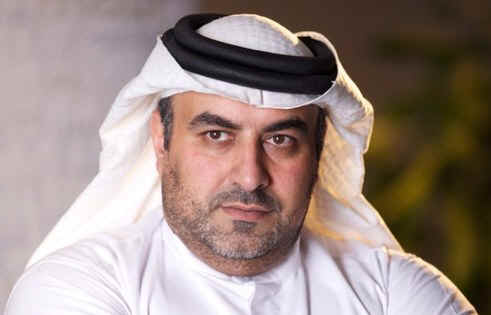
Mansoor Lootah: attacked Human Rights Watch
Mystery group defends UAE's rights record
Vitriolic response to criticisms
21 Feb 2015: Human Rights Watch has recently come under attack from a mysterious Swiss-based organisation objecting to a section of its annual World Report which discusses the United Arab Emirates.
Summarising the human rights situation in the Emirates, HRW's report said:
"The United Arab Emirates (UAE) continued in 2014 to arbitrarily detain individuals it perceives as posing a threat to national security, and its security forces continued to face allegations that they torture detainees in pretrial detention.
"UAE courts invoked repressive laws to prosecute government critics, and a new counterterrorism law poses a further threat to government critics and rights activists.
"Migrant construction workers on one of the country’s most high-profile projects continued to face serious exploitation, and female domestic workers were still excluded from regulations that apply to workers in other sectors."
This prompted a vitriolic response from the International Gulf Organization (IGO) which describes itself as a "non-governmental organisation dedicated to implementing the Universal Declaration of Human Rights at regional and international levels".
In a denunciation posted on IGO's website, the organisation's chairman, Mansoor Lootah, accused Human Rights Watch of "targeting" the UAE. The article continued:
"He [Lootah] equally pointed out that this targeting has its motives and grounds on the organisation’s side and that they are selfish and far away from the lofty human values founded by the Universal Declaration of Human Rights and as enshrined by the International Bill of Rights and Freedoms.
"The Human Rights Watch Report specifically for this year, is a drastic violation of those rights and freedoms with its allegations, defects and contradictions which makes clear the goals, rationales and its value and considerations of rights which the Report failed to mention..
"This also greatly influenced the Report’s credibility and reliability, especially in some aspects with which the Report has dealt shamefully with no justification, appreciation or respect of the public awareness, and without observing any limits of integrity, fairness and credibility."
Besides appearing on IGO's website, the article was also circulated by WAM, the UAE government's news agency, and published or summarised by at least two Emirati newspapers, the Khaleej Times and The National.
It's interesting that Emirati media think the International Gulf Organization is credible enough to be worth quoting, since it is a very peculiar NGO (if, in fact, it really is an NGO). Its website gives no postal address and no phone number, and a web page purportedly listing its board of directors is entirely blank. Unlike most NGOs, its website doesn't invite donations from the public. There is, however, a place on the website where people can apply to become a member of IGO, but it's not very inviting: you have to provide a copy of your CV and explain why you want to join.
Although IGO claims to be an international organisation with headquarters in Geneva, it seems to be mainly interested in fending off complaints about the UAE's human rights record.
In 2013 it produced a documentary film about the controversial trial of 94 Islamists accused of conspiracy in the UAE. The film challenged claims that the trial was unfair and the UAE's government-run National Media Council helpfully organised a special showing of it for journalists.
IGO claimed to have financed the film itself, without government support. Bloomberg reported at the time:
"Robert Resto, IGO’s marketing and media manager, declined to say how the group, which he described as a not-for-profit and non-government group, is funded."
Last year IGO produced a 13-page report on legislation in the GCC countries relating to domestic workers.
Although the report was not uncritical of Gulf states' performance in this area, the Migrant Rights organisation accused it of misrepresenting the situation faced by domestic workers and regurgitating government talking points without substantive analysis.
Earlier this week, IGO signed an agreement with the Egyptian Organisation for Human Rights which (according to IGO) will "enable the two bodies to work more effectively to protect and boost the respect for human rights, and to spread the culture of human rights and develop the legislations and practices related to human rights in the Arab world".
Twitter antics
UAE-linked rights group and some odd goings-on
22 Feb 2015: In a blog post earlier this month I wrote critically about the Global Network for Rights and Development (GNRD) and raised some questions about a conference on human rights and counterterrorism that it was organising in Geneva.
Some of those who attended the Geneva conference seem to have been under the impression that GNRD is a normal sort of human rights NGO, and at first glance it does look like one. It is registered in Norway and is very active in Brussels, where it is recognised for lobbying purposes at the European parliament.
GNRD is also well funded – to the tune of 3.5 million euros a year – though the sources of this income are unclear. GNRD says its "main sponsor" is the Deeb Foundation (which presumably has some connection with GNRD's president, Loai Deeb).
Between 2007 and 2010, Deeb was head of the so-called Scandinavian University, a fake educational institution (see photograph). The "university" boasted of having 175 professors and more than 300 lecturers but turned out to have no staff at all and was eventually closed under the threat of legal action by the Norwegian authorities.
Apart from the odd background of its president, GNRD has some rather strange ideas about human rights. For instance, it has a particularly favourable view of human rights in the UAE – in contrast to Human Rights Watch and the US State Department, both of which have been very critical of the UAE's performance.
GNRD produces an international league table of human rights and the most recent one (rather incredibly) ranked the UAE in 14th position worldwide – just one place behind the UK and far ahead of any other Arab country. Following criticism in social media, that league table has now been deleted, though another one is promised in 67 days.
Articles on GNRD's website portray the UAE's human rights record in a highly positive light. One article comments favourably on the role of women in the UAE. Others talk about the UAE's "achievements in the field of promoting and protecting the family and its members", also praising the UAE for its environmental efforts, and for the way it cares for the disabled and protects the rights of children.
More recently, GNRD has been developing a relationship with the Sisi regime in Egypt (see blog posts here and here).
GNRD has also become associated with some rather juvenile antics involving social media. When I first wrote about it last September, the organisation had an incredible 1.14 million Twitter followers – all achieved, apparently, on the back of a mere 359 tweets. Analysis at the time via the Social Bakers website suggested most of these followers were fakes. The number of its Twitter followers has since dropped below the million mark to 995,201. Its Facebook page, meanwhile, has 1,284,104 "likes".
Following its conference on human rights and counterterrorism in Geneva last week, GNRD posted videos of the main speeches on YouTube. Since then, the speech by Khaled al-Shaar, a Bahraini MP, has had 142 views while only 31 people have viewed the speech by Anatoly Kulikov, a Russian army general.
These speakers were dramatically outshone, however, by GNRD's president, Loai Deeb, whose speech has supposedly been viewed 257,511 times on YouTube in the space of just four days. His speech has also been "liked" 47,531 times on Facebook. On Twitter, the link to his speech has been retweeted 5,753 times and favourited 3,701 times:
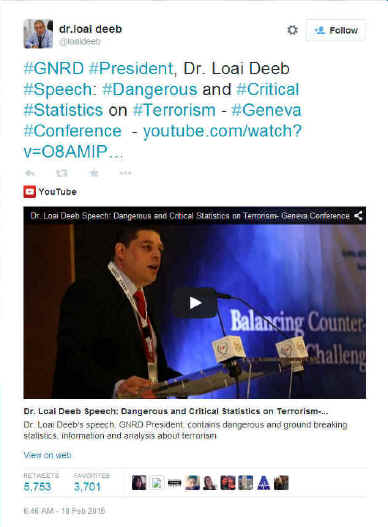
A look at the Twitter accounts that have endorsed Deeb's speech suggests they are no more genuine than his "Scandinavian University". Most of them have few followers and no noticeable interest in human rights or counterterrorism. In general, they look to have been set up mainly for marketing purposes.
My most recent article about GNRD was posted on 9 February and shortly after that some odd things started happening.
On 11 February I discovered that someone had set up a fake Facebook account using my name and photograph. I found out about it when friends on my genuine Facebook page received invitations to befriend me again – on the fake page. The fake page could easily have been mistaken for the real thing, though it had adapted my CV to include some inflated claims – for example that I studied at Cambridge University (which I didn't).
I reported the fake page to Facebook, who promptly deleted it. But shortly after that my own Facebook account was suspended because someone had complained to Facebook that I was using a false name. I provided Facebook with a scan of my passport and the account was restored a few hours later.
Around the same time, I received a message from Twitter that someone had tried (unsuccessfully) to get into my account and reset the password.
I have never had problems of this kind with Twitter or Facebook before, which led me to wonder if they were triggered by something I had written. There was no particular reason, other than their timing, to suggest they might be connected with my article about GNRD, though in the light of subsequent events I am beginning to wonder.
On 16 February, a new Twitter account called Media & Intelligence (@Media_intel) announced that it would "expose all journalists working with intelligence agencies around the world" – and it turns out that I was one of those it was planning to "expose" ...
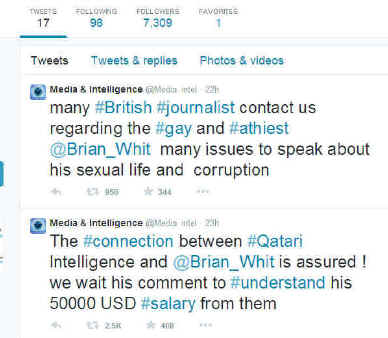
The second of these, about my non-existent Qatari salary, seems to be very popular on Twitter. It has so far been retweeted 2,495 times and favourited 408 times.
Another one (below) has been retweeted 3,639 times and favourited 876 times:
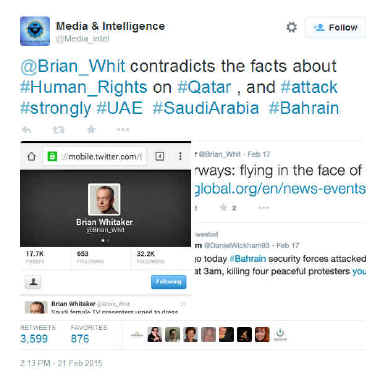
Another tweet, posted today, has had less retweeting (at least, so far):
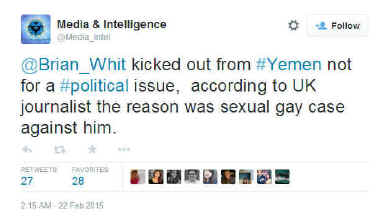
For the record, I have never been kicked out of Yemen or engaged in any sexual activity during visits there, but the interesting thing about all this is the organised nature of the retweeting.
And if you look at where the retweets are coming from, you will see that they are almost all coming from the same suspect Twitter accounts that were retweeting Loai Deeb's speech a few days earlier.
Faking it on Twitter
Bogus accounts promoted rights organisation
23 Feb 2015: Fake Twitter accounts which have been used to promote a controversial human rights organisation are now being used to target me after I criticised the organisation in blog posts.
A series of tweets posted over the weekend claimed that I was being paid $50,000 a year by the Qatari government and had been expelled from Yemen for a sexual offence.
These claims were widely retweeted by fake Twitter accounts – accounts which had earlier publicised a speech given by Loai Deeb, president of the Global Network for Rights and Development (GNRD) in Geneva last week.
A new tweet which appeared overnight, and has since been retweeted more than 1,000 times, continues in a similar vein to the others:

The accounts doing the retweeting appear to be used mainly for marketing purposes and some of them are obvious fakes.
For example, one Twitter account that promoted Deeb's speech and has since retweeted two of the tweets about me uses the name "The CALPRO Group". This is the name of a real company but the account is a fake. The real company has a real Twitter account which is here.
Readers are welcome to explore other Twitter accounts involved in this retweeting. Please let me know if you find anything of interest. Presumably someone is paying for the retweets and I would welcome any information that could help identify who is paying.
Last week GNRD held a conference in Geneva on human rights and counterterrorism, and videos of some of the speeches were later posted on YouTube.
The 27-minute speech in Arabic by GNRD's president, Loai Deeb, has supposedly been viewed on YouTube 325,318 times in the six days since it was posted. On Facebook it has been "liked" 47,532 times. On Twitter, a link to the speech has been retweeted 5,753 times and favourited 3,702 times.
The apparent popularity of Deeb's speech is remarkable considering that none of the other speakers has come anywhere close to matching his viewing figures. The speech by Khaled al-Shaar, a Bahraini MP, for instance, has had a mere 147 views while onthe speech by Anatoly Kulikov, a Russian army general, has been watched only 32 times.
Loai Deeb was formerly head of the so-called Scandinavian University, a fake educational institution (see photograph). The "university" boasted of having 175 professors and more than 300 lecturers but turned out to have no staff at all and was eventually closed under the threat of legal action by the Norwegian authorities.
The price of criticising the UAE
Online vilification continues
26 Feb 2015: As regular readers will know, some odd things have been happening since I raised questions about the Global Network for Rights and Development (GNRD), an organisation registered in Norway which has links to the United Arab Emirates and takes an unusually favourable view of the UAE's human rights performance.
I have also raised questions about another Emirati-linked "human rights" group, the Swiss-based International Gulf Organization (IGO), which earlier this month attacked Human Rights Watch over its criticisms of the UAE.
It was a couple of days after my most recent blog post about GNRD that the weird things began. The details are here and here but, just to recap:
-
Someone created a fake Facebook profile using my name and photograph.
-
My own Facebook account was suspended after someone complained that I was using a false name.
-
Someone attempted to hack into my Twitter account.
-
A Twitter account called @Media_intel began making false claims about me. One of its tweets said I was being paid $50,000 a year by Qatar; another said I had been expelled from Yemen for a sexual offence.
-
The claims were then retweeted by hundreds of fake Twitter accounts.
Interestingly, these same fake accounts had been used earlier to mass-tweet links to a speech by Loai Deeb, the president of GNRD. This leads me to believe that whoever organised or paid for the promotion of Deeb's speech through fake accounts also organised or paid for the retweeting of @Media_intel's claims.
Now for a brief update.
-
Someone has set up a fake Twitter account in my name (@BrianWhitak). This hasn't been very active so far but it includes some tweets copied from my real Twitter account (@Brian_Whit).
-
During a periodic check of the statistics for my website I found there had been 52,300 page views last Friday and 27,638 on Saturday. As far as I'm aware, both these figures are far higher than I have ever had before on a single day. Daily traffic to the website is usually in the range of 3,000-4,000 page views and doesn't fluctuate much. I can't see any explanation for this surge in traffic except, perhaps, as an attempt to crash the website.
-
Several new Twitter accounts have begun posting about my imagined connection with Qatar.
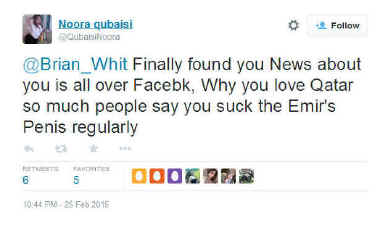
... and another:
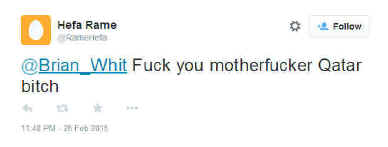
I have also received emails thanking me for subscribing to websites that I haven't subscribed to. One was a dating website; the other was bayt.com, a job-search website. Someone has created a fake profile/CV at bayt.com which uses my photograph (below) and says I am looking for employment in Qatar.
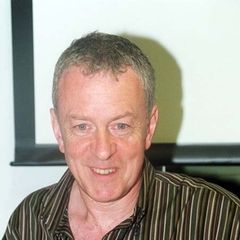
I was particularly intrigued by the photograph of myself. It has appeared only a handful of times on the internet and I don't recall when or where it was taken, but I do remember the last time I saw it.
The same picture was used in a Tweet by @emarati001 in 2012 when I was still working at the Guardian and the paper came under attack from the UAE:
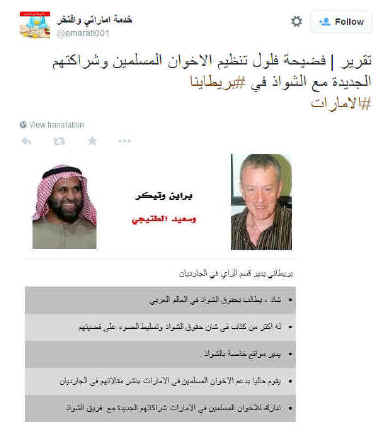
The photograph also figured in a Twitter campaign (accompanied by a YouTube video) under the hashtag #uk_supports_traitors:
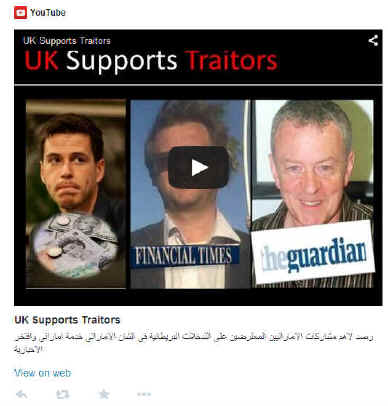
The main cause of the 2012 campaign against the Guardian was an article by Said Nasser al-Teniji, an Emirati Islamist, published on the paper's website. The online abuse was directed mainly against me and Ian Black, the Guardian's Middle East editor, even though neither of us had played any part in the publication of Teniji's article.
Ian Black referred to this later in a Guardian article about
the UAE's sensitivies:
"The Emirati authorities ... do not take negative publicity lying down. A recent comment piece in the Guardian by an Islah activist has attracted particular venom. The fightback in Abu Dhabi has been fast and abusive. Under a Twitter hashtag #UK_supports_traitors the Guardian and BBC have been accused of being in the pay of the Qataris; knowledge of Arabic is produced as evidence of involvement in 'espionage'. Harassed foreign office diplomats are being forced to explain that the British government does not control the British press.
"But the campaign is wider than that. The UAE has been lobbying hard in both Washington and London against their 'honeymoon' with the new regimes of the Arab spring, with special emphasis on Egypt. It is perhaps over-stating the case to call this effort a Gulf 'counter-revolution' but the Cold War notion of 'containment' certainly fits the bill."
If I were to ask Emirati officials about this online harassment I'm sure they would deny it has anything to do with their government. They would probably attribute it to over-zealous Emirati citizens who feel slighted by criticism of their country.
What puzzles me, though, is why Emiratis specifically would indulge in such crude behaviour. I have probably said critical things about every country in the Middle East at some time or other and the reactions have been varied, but I have seen nothing from other countries in the region quite like this.
GNRD's 'High Commissioner' sentenced
Another blow for UAE-linked organisation
8 March 2015: Last week brought more embarrassment for the UAE-linked Global Network for Rights and Development (GNRD) following the revelation a few months ago that its founder/president had previously run a fake university in Norway. On Thursday, a court in Belgium gave GNRD's extravagantly-titled "High Commissioner for Europe" a suspended prison sentence and banned her from public office for five years.
The "High Commissioner" is Anne-Marie Lizin, a veteran Belgian politician whose GNRD duties include overseeing GNRD-W, a newly-established department concerned with the rights of women and girls.
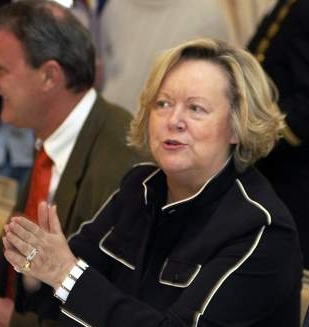
Anne-Marie Lizin: five-year suspension from public office. Photo: Guy Goossens
In her political career Lizin served three years as president of the Belgian senate and is currently its honorary president but the criminal case relates to her time as mayor in the historic town of Huy – and the use of municipal employees (who in any case ought to be politically neutral) for distributing election literature on her behalf.
The arrangement was that employees who canvassed for Lizin during working hours would not have any pay deducted or be required to make up the lost time. This meant the municipality, in effect, would be subsidising Lizin's campaign.
Last Thursday, an appeal court in Liege confirmed the sentence imposed earlier on Lizin by a lower court. Lizin is planning a further appeal – to Belgium's Supreme Court – and the ban on holding public office will not take effect until all legal avenues have been exhausted.
Lizin, who was expelled from the Socialist Party in 2009, clung to her mayoral post in Huy for 26 years and left it acrimoniously. Having been forced to resign amid a series of scandals, she then got into a dispute with the new mayor, Micheline Toussaint, about parking spaces behind the Town Hall which resulted in Lizin ramming Toussaint's car (reports here and here).
Belgian media also reported that after leaving office Lizin had retained a mobile phone provided by the municipality. This only came to light when the municipality received a 5,000 euros bill which Lizin reportedly agreed to pay after being threatened with legal action.
Next Tuesday, Lizin is due to speak at a GNRD event in Geneva, held on the sidelines of the Human Rights Council. According to the blurb, this will focus on the outcomes of a conference about human rights and counter-terrorism which GNRD held in Geneva last month (and which I discussed in an earlier blog post).
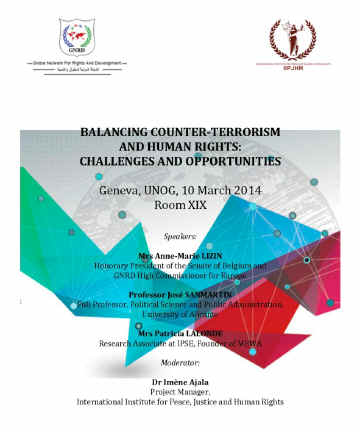
GNRD's invitation to next Tuesday's event
Lizin also spoke at the February conference and the text of her speech (in French) is here. She writes frequently about her GNRD activities on her website.
Continuing harassment
Following a previous blog post about GNRD and another about the International Gulf Organization, a "human rights" group that appears to be a front for the Emirati government, supporters of GNRD and the UAE launched a campaign of online harassment directed against me:
-
Someone created a fake Facebook profile using my name and photograph.
-
My own Facebook account was suspended after someone complained that I was using a false name.
-
Someone attempted to hack into my Twitter account.
-
A Twitter account called @Media_intel began making false claims about me. One of its tweets said I was being paid $50,000 a year by Qatar; another said I had been expelled from Yemen for a sexual offence.
-
The claims were then retweeted by hundreds of fake Twitter accounts which had previously been used to advertise a speech by GNRD's founder/president, Loai Deeb.
For more details of this harassment, see my earlier blog post.
Last week there was a further attempt to hack my Facebook account and my Twitter feed continues to be spammed by tweets from fake accounts.
This might seem a very strange way for supporters of a human rights organisation to behave, but GNRD does say on its website that it "uses out of the ordinary and unique approaches" in its work.
Banned politician monitored Egypt's election
More questions about Anne-Marie Lizin
8 March 2015: A European politician who has been banned from public office because of electoral malpractice was involved in monitoring the 2014 presidential election in Egypt.
Last Thursday, an appeals court in Belgium confirmed a suspended prison sentence and a five-year ban from holding public office imposed on Anne-Marie Lizin.
Lizin is currently honorary president of the Belgian senate but the criminal offence relates to her time as mayor in the historic town of Huy. (For background, see my earlier blog post.)
Lizin is also closely involved with the Global Network for Rights and Development (GNRD), where she holds the grand title "High Commissioner for Europe".
Last year GNRD was part of a "joint mission" to monitor the presidential election which legitimised General Sisi's seizure of power. The mission produced an enthusiastic report. It said:
"The Egyptian people have experienced a unique process toward democratic transition, and despite the fact that minor errors and inaccuracies occurred, these do not shed a negative light on the overall results of the electoral process".
The report continued:
"The Joint Mission was honoured to be a part of the 2014 Egyptian Presidential Election and contribute to promoting its transparency, integrity, and success. The Joint Mission expresses its hope that these contributions will support Egypt’s development and a smooth transition to democracy. We wish success to Egypt, being one of the most influential countries in the Middle East, and commend their achievements thus far towards a path to democracy."
Through her involvement with GNRD, "High Commissioner" Lizin played a senior role in the monitoring mission. She can be seen here (on the right) in a picture posted on her website:
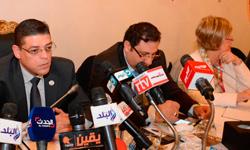
She also appears in a YouTube video of a conference where the mission reported its findings. At 5min 52 sec into the video, she complains that Europe has been hesitating "to support Egypt":
"I am coming from the centre of Europe – Brussels – and Europe was hesitating to support Egypt. But we must say our mission, and especially GNRD, will never hesitate. We have said from the beginning we should be present to observe elections and to say election is part of democracy."
GNRD's efforts seem to have found favour in Egypt. Last January it was named by the Supreme Electoral Commission as one of only five international organisations that will be allowed to monitor Egypt's forthcoming (but recently postponed) parliamentary elections.
Lizin's electoral malpractice case was not something that popped up unexpectedly last week. Before Thursday's appeal hearing it had been dragging on for several years and had been reported in the Belgian press. If GNRD knew about it, why did they allow her to join the monitoring mission in Egypt, since that risk damaging its credibility?
Or perhaps GNRD didn't know. Perhaps they appointed Lizin as their High Commissioner for Europe without looking carefully into her background. If so, it doesn't say much for GNRD's ability to spot malpractice in Egyptian elections either.
Scientologist Lord McNair, assisted by Mahmoud Heidari, talks to Iranians about human rights, 11 February 2015.
Scientologists provide human rights training
GNRD and Iranian exiles attended workshops
9 March 2015: I have been writing rather a lot about the Global Network for Rights and Development (GNRD) lately. It's a story with some strange twists and turns, from the discovery that its founder/president once ran a fake university in Norway, to the sentencing of its "high commissioner" for electoral malpractice in Belgium – plus, of course, the use of fake internet accounts to harass me for writing about it.
The latest twist is no less strange. Take a look at this item on GNRD's website. It reports that GNRD "attended human rights training workshops" in London on February 28.
We're told in the article that these workshops have provided human rights training for "dozens of Arabs and Kurds from Syria, Iraq and Iran". We're also told that after an informal start about a year ago, the workshops have now become more formal, with teaching materials in several languages and certificates issued to trainees.
But who exactly is responsible for this training? GNRD's article says:
"The workshops were held at the American writer and philosopher L Ron Hubbard’s museum in London, which was home to the famous Irish playwright George Bernard Shaw in 1881.
"They were run by Lord Duncan McNair, who is a member of the Liberal Democrats Party, which is one of the two parties in the British coalition government."
Either GNRD was totally hoodwinked or it is being disingenuous here. L Ron Hubbard, as GNRD omits to mention, was founder of the Church of Scientology.
Furthermore, if you look up Lord McNair on Google, you will find that he is a member of the Church of Scientology. He has said so himself, in the House of Lords. Critics have described him as "Scientology's representative in parliament".
McNair's wife, Lady Margaret, is patron of the Citizens Commission on Human Rights, a Scientology front organisation which campaigns against psychiatry.
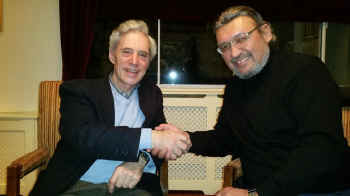
Lord McNair with GNRD representative at the Hubbard building in London
Besides GNRD, an Iranian exiles group called Tribon-e-Azad has also received human rights training from the Scientologist Lord. Tribon-e-Aza has organised at least 10 events at the Hubbard building in London during the past year – with McNair billed as the speaker for most of them.
A few videos from these events can be found on the group's YouTube channel and the group also advertises the workshops on its website.
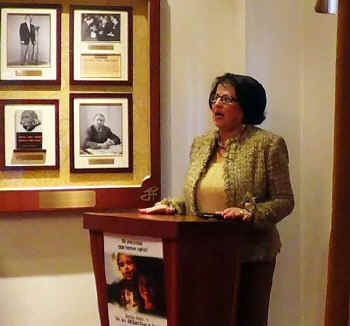
Gity Kaveh, founder of Tribon-e-Azad, speaks during a session in the Hubbard building
As with GNRD, Tribon-e-Azad is either unaware of the Scientology connection or concealing it. The website explains that Lord McNair was already working with an organisation called Youth for Human Rights and was thus able to make use of its "platform" for the Iranians' training. At least six of the workshops carried the title "Youth for Human Rights".
Youth for Human Rights is another Scientology front organisation.
GNRD's article about the training workshops ends by saying Lord McNair has "expressed his desire to cooperate with GNRD" in the area of human rights. I do hope so. It should be fascinating.
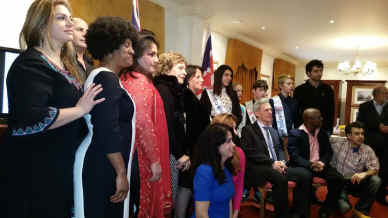
International Women's Day gathering at the Scientologists' Fitzroy House in London.
Scientology and women's rights
Does GNRD know what it's getting into?
11 March 2015: The Church of Scientology continues to develop its secretive relationship with the Global Network for Rights and Development (GNRD).
In a blog post on Monday, I noted that GNRD had attended "human rights training" workshops in London conducted by Lord Duncan McNair, a prominent British scientologist, and held in Fitzroy House – a museum dedicated to the memory of Scientology's founder, L Ron Hubbard.
On its website, GNRD published an article about the training but without mentioning the word "Scientology". It described Hubbard as an "American writer and philosopher" and, equally innocuously, described McNair as "a member of the Liberal Democrats Party" in Britain.
GNRD was back at Fitzroy House on Sunday, for a celebration of International Women's Day which it says was "attended by a large number of activists and women's rights advocates from around the world".
There were numerous Women's Day events in London last weekend, including a march led by female celebrities, and it does seem odd that GNRD should have latched on to one run by the Scientologists rather than more mainstream organisations. Once again, the report about this event posted on GNRD's website completely avoids the "S"-word.
Scientologists often operate surreptitiously, and it is unclear whether GNRD is trying to conceal its involvement with them or just very naive. Inside Fitzroy House the walls are covered with Hubbard memorabilia so it would be surprising if GNRD had not enquired further about the man and his work.
Similarly, GNRD gives an approving mention in its article to the role played by "Youth for Human Rights International" in Sunday's event but doesn't seem to have done even a basic Google check on the organisation – which would have shown that it is a front for the Church of Scientology.
GNRD states on its website that it uses "out of the ordinary and unique approaches" to achieve its goals, and it is certainly an unusual kind of human rights organisation.
Loai Deeb, its founder/president previously ran a fake university in Norway. Also, Anne-Marie Lizin, its "High Commissioner for Europe", has been given a suspended sentence and banned from public office for five years because of electoral malpractice in Belgium.
The smears turn nastier
GNRD supporters step up their campaign
13 March 2015: My continuing investigation into the UAE-linked Global Network for Rights and Development (GNRD) has prompted a renewed smear campaign directed against me by the organisation's supporters.
At first sight, GNRD appears to be a normal human rights and development organisation. It has consultative status at the United Nations. It is recognised by the EU and registered for lobbying purposes at the European Parliament in Brussels. It also has a cooperation agreement with the African Union and has acted as an official observer for elections in several Arab and African countries.
In other respects, though, it is far from normal. Its founder and president, Loai Deeb, previously ran a fake university from his home in Norway. It closed down under threats of legal action by the Norwegian authorities.
Another senior GNRD figure, Anne-Marie Lizin, who is known as the organisation's "High Commissioner for Europe", has been convicted of electoral malpractice in Belgium – for which she has been given a one-year suspended prison sentence and a five-year ban on holding public office.
Regardless of that, Lizin was part of an official GNRD observer team during Egypt's presidential election last year. A subsequent report hailed Egypt's "achievements thus far towards a path to democracy".
Unlike most human rights organisations (and the US State Department), GNRD also adopts an unusually favourable view of human rights in the United Arab Emirates where Loai Deeb has (or at least had) a consultancy business.
My previous blog posts about GNRD drew a vicious response from supporters of GNRD and the UAE. Besides multiple attempts to hack my Twitter and Facebook accounts, hundreds of fake Twitter accounts were used to circulate smears about me. The same fake accounts had previously been used to advertise a speech by GNRD president Loai Deeb.
One allegation was that I am paid $50,000 a year by Qatar, and another that I had been expelled from Yemen for a sexual offence. Both are completely untrue.
Following my latest revelation about GNRD's developing links with the Church of Scientology, the smears have started again and become even nastier. This time there's a YouTube video which once again is being publicised via fake accounts on Twitter. It has so far been re-tweeted 5,400 times. At least some of the accounts involved in this had previously tweeted about Deeb's speech. Here is one example from an account called @mmconod. On February 18 it posted this:
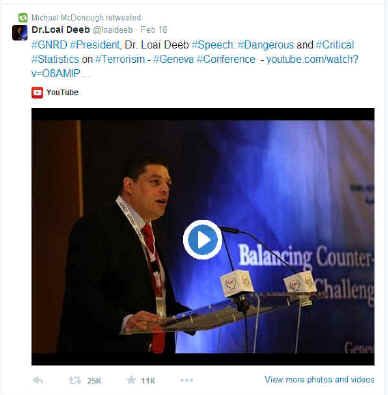
... and yesterday it posted this:
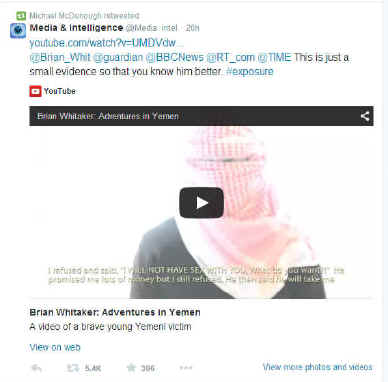
Deeb's speech, incidentally, has been retweeted 25,000 times and the YouTube video of it has purportedly been viewed an unbelievable 1,185,810 times.
The video about me is titled "Brian Whitaker: Adventures in Yemen". It shows a disguised figure in an Arab headscarf and contains text in English. The text is very unpleasant but I have decided to quote it in full, to show readers just how far GNRD's supporters are prepared to stoop:
"A person came to my town in Yemen, and he goes by the name 'Brian Whitaker'. He says he is a famous journalist in the United Kingdom. But he soon revealed himself as a sexually deviant (homosexual). I want to send a message out to everyone: be very careful of this person.
"He came to Yemen and helped with the overthrow of the government in Yemen. He used to travel to Hadda (high class street) to find people to have sexual intercourse. It was first time I meet up with him, said we want to go out and have a good time. We went to dinner and stayed up all night.
"We sat down together and took drugs (Qat). He wanted to speak with me (sexually). I said, 'What do you want?' He replied, 'I want you to have sex with me.'
"I refused and said, 'I WILL NOT HAVE SEX WITH YOU, What do you want?' He promised me lots of money but I still refused. He then said he will take me to Qatar. You will get a good job, salary and live a good life. He convinced me to have sex with him. He wanted to have sexual intercourse daily.
"He told me to introduce him to my friends in order for him to use them (for sexual intercourse) too. I want everyone to send Brian Whitaker a message and to be careful of people like Brian Whitaker who are a threat to the Arab world."
Needless to say, the video is a complete work of fiction, and I did not visit Yemen at all during or around the time of "the overthrow of the government".
University signs deal with GNRD
Peace studies centre to provide interns
18 March 2015: While developing a relationship with the Church of Scientology in London, the controversial Global Network for Rights and Development (GNRD) has also been active up in the Arctic Circle. It has signed an internship agreement with the world's northernmost university, in Tromsø, Norway.
An announcement on GNRD's website says the agreement was signed by Christine Smith-Simonsen, director of the university's Centre for Peace Studies (CPS), and Ahmad Salem, GNRD's chief public relations manager. It continues:
"This agreement was entered into for the purpose of strengthening the relationship between CPS and GNRD and to provide high calibre CPS graduates with the possibility of getting interesting and relevant work experience in specific human rights and development departments through an internship with GNRD.
"After the signing of this carefully drafted agreement, the GNRD representatives were kindly shown around the faculty and had the opportunity to speak with a current CPS student, who expressed his interest in the internship programme."
In other words, the university's Centre for Peace Studies (which was established with funding from the Norwegian parliament) will be providing GNRD with free labour. There is also talk of joint research projects:
"CPS and GNRD both expressed their enthusiasm and interest in collaborating together and their desire to work on research projects together in the future. The signing of this agreement represents the basis of an important partnership between CPS and GNRD."
[Update: the announcement of this agreement has since been deleted from GNRD's website.]
GNRD is based in Norway where its founder/president, Loai Deeb, previously ran a fake university from his home in Stavanger (see photograph). The Scandinavian University (as it was known) boasted of having 175 professors and more than 300 lecturers, plus a wide range of courses stretching from engineering and economics to sharia and Islamic Studies. However, documents filed with the Norwegian authorities showed that despite the claims of a large teaching staff it had no employees at all.
The Norwegian education ministry became concerned that potential students could be misled into thinking it was an accredited institution, and in 2010 Deeb's university closed after being threatened with legal action.
Another senior GNRD figure, Belgian politician Anne-Marie Lizin, has been convicted of electoral malpractice and given a suspended prison sentence along with a five-year ban on holding public office.
GNRD also has links to the United Arab Emirates and adopts an unusually favourable view of human rights practices there.
A very peculiar feature of GNRD is the character of its online supporters, at least some of whom appear to be ardent supporters of the UAE and virulent opponents of Qatar. They have used hundreds of fake Twitter accounts to promote GNRD and also to launch a smear campaign against me after I began investigating GNRD and writing blog posts about it.
Fakery continues
In some cases, efforts have been made to make these fake Twitter accounts look like genuine accounts. One of them, for example, appears to be connected with a project at Columbia University's School of Journalism. But it isn't. The school's real account is here.
The fake account has posted a series of retweets from Loai Deeb's Twitter account, including this one yesterday:
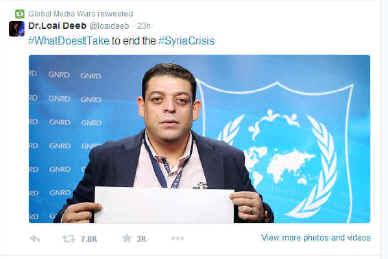
On March 12 the same fake account also retweeted a video from the smear campaign against me:
 =
=
I described the video in a previous blog post.
Apart from general harasssment, such as trying to hack my online accounts and creating a fake Facebook profile using my name, the campaign has mostly focused on making fictitious sexual allegations and falsely claiming that I am paid by the government of Qatar.
An item posted in several places on Facebook yesterday (and since deleted by Facebook's moderators) made the bizarre claim that I had been paid by Qatar for a blog post in 2011 headed "Royal charity fights homosexuality in Qatar". This was cited as evidence of my "support" for Qatar when in fact it criticised Sheikha Moza bint Nasser, the emir's wife.
Part of my blog post said:
"I began to have doubts about Sheikha Moza's enlightenment a few years ago, when she hosted a conference in Qatar which brought together some of the world's most reactionary religious elements – Mormons and Catholics as well as Muslims – to 'defend the family'. The family is in peril, she warned in her opening speech, because of attempts to 'redefine the concept of family in a manner contrary to religious precepts'.
"Now, another of the Sheikha's more dubious charitable enterprises has come to light. It's al-Aween, which she established as Qatar's first centre to combat 'deviation from acceptable social behaviour' and 'provide specialised treatment for all kinds of behavioural deviation that require thorough intervention and treatment by specialists'.
"Alongside violence, bullying and drug abuse, al-Aween also applies its specialised 'intervention and treatment' to 'internet addiction' and homosexuality."
The blog post went on to talk about al-Aween's strange ideas for dealing with homosexuality and other supposed "problems" in Qatar such as men with long hair and girls who wear trousers.
What I can't understand is how anyone might imagine the Qatari government would want me to write that, let alone pay me for doing so.
Critics of UAE face new harassment
Who hired the private investigator?
28 March 2015: Two Americans who publicly criticised the exploitation of migrant workers in the United Arab Emirates have found themselves under investigation by a private detective, the New York Times reports.
A private investigator called Loren Berger has been making inquiries about Andrew Ross, a professor at New York University (NYU), and Ariel Kaminer, a journalist who formerly worked for the New York Times – reportedly in the hope of finding people who would say negative things about them.
Earlier this month Ross was refused admission to the Emirates, where NYU has a campus. Ross, who has frequently criticised the university's arrangement with the UAE, had been planning to continue his research into labour conditions there.
Kaminer reported critically on UAE labour conditions in an article for the New York Times which was published last May.
Sean O'Driscoll, a freelance reporter who worked with Kaminer on the article, has since told the New York Times that he was offered "generous payments and immunity from prosecution if he would write favorably about the [UAE] government". He said he had refused and had not been permitted to re-enter the country after leaving for a short period, the paper added.
When contacted by the New York Times, Berger – the detective – said: "I can't tell you who I’m working for ... I don't know who the client is. It's not unusual." The NYT's report continues:
On January 29, Ms. Berger called Susan Fraiman, a professor of English at the University of Virginia. Professor Fraiman had written critically about some of Professor Ross’s academic work.
Ms Berger “said something like, ‘We’re looking for people to comment negatively,’ ” Professor Fraiman recalled in an interview. “I told her that I don’t know him personally. It seemed odd.”
She said that she had asked about the context of the investigation, and that Ms Berger had told her the president of NYU was under fire over the university’s involvement in the Emirates.
As Professor Fraiman recalled the conversation, “She said: ‘We’re investigating Andrew Ross for his comments about this and a particular journalist, Ariel Kaminer, who wrote about it. By the way, do you know her?’ ”
Both Professor Fraiman and Ms. Kaminer attended Princeton University, but at different times; both said they did not know each other.
New York University has issued a statement saying it has no knowledge of Berger's investigation and no involvement in it. “It’s reprehensible and offensive on its face, and we call on whoever is involved to desist immediately.”
Asked by the New York Times if the UAE also condemns the surveillance or can cast any light on it, a spokeswoman for the Emirates embassy in Washington did not respond. The paper notes that the UAE government "has a record of striking back at those critical of migrant labour conditions there".
Regular readers of this blog will know that I have been facing persistent online harassment as a result of articles I wrote about two strange "human rights" organisations which have links to the UAE.
One was the International Gulf Organization (IGO), based in Switzerland, which describes itself as a "non-governmental organisation dedicated to implementing the Universal Declaration of Human Rights at regional and international levels". Last month IGO published a vitriolic attack on Human Rights Watch which it accused of "targeting" the UAE in its annual World Report.
The other organisation is the Global Network for Rights and Development (GNRD), based in Norway, which also has links to the UAE and promotes an unusually favourable view of human rights there.
The harassment, which began in mid-February and was still continuing yesterday, has included repeated attempts to hack my Twitter and Facebook accounts, the creation of fake online profiles using my name or photograph, and the use of hundreds of fake Twitter accounts to post false and defamatory allegations about me.
These include claims that I am paid $50,000 a year by the government of Qatar and that I am evading tax.
A video posted anonymously on YouTube claims that I was in Yemen during the uprising against the Saleh regime (which I was not) and induced a Yemeni man to have sex with me by offering him money and a job and Qatar.
The latest effort is a blog called "Brian Whitaker owns fake companies", where an article purportedly written by someone called Adam L Conner claims:
"In 2007, Brian was made redundant from The Guardian because of his bias articles that favoured Qatar’s position on issues in the Middle East."
In fact, I left the Guardian in 2012 – five years later – for reasons that were unconnected with anything I had ever written about Qatar. As evidence of my supposed support for Qatar, Conner cites one of my blog posts which criticised Sheikha Moza, wife of the former emir. Bizarrely, Conner claims the article "had a clear intention of glamourising the Qatari royal family".
There is also a new Wikipedia Arabic page titled "Brian Whitaker, Reporting for Qatar", though as yet it has no content.
I made a formal complaint that Conner's blog posts were defamatory and received an email from Google saying that if I wanted them removed I would have to get a court order. The email continued:
"Blogger hosts third-party content. It is not a creator or mediator of that content. We encourage you to resolve any disputes directly with the individual who posted the content.
"If you cannot reach an agreement and choose to pursue legal action against the individual who posted the content, and that action results in a judicial determination that the material is illegal or should be removed, please send us the court order seeking removal.
"In cases where the individual who posted the content is anonymous [as in this case], we may provide you with user information pursuant to a valid third party subpoena or other appropriate legal process against Google Inc."
The same fake Twitter accounts posting defamatory allegations about me are also being used to promote the work of GNRD and its founder-president, Loai Deeb, a lawyer of Palestinian origin who previously ran a fake university in Norway which closed down under threat of legal action by the Norwegian authorities.
Among other things, the fake accounts have been promoting a 27-minute speech about terrorism that Deeb gave last month. It has now been retweeted almost 25,000 times and a video of the speech itself, posted on YouTube, has supposedly been viewed an unbelievable 1,185,864 times.
Deeb appears to be an extraordinarily popular Twitter user, with almost 1.2 million followers. However, he has posted only 387 tweets – which means that on average each tweet must have attracted more than 3,000 new followers.
Some characteristics of the current online harassment reveal striking similarities to a campaign organised by supporters of the UAE in 2012 when I was still working at the Guardian. An opinion article by a member of the Muslim Brotherhood which appeared on the Guardian's website infuriated the UAE government, and this resulted in online abuse directed against me and the paper's Middle East editor, Ian Black. The UAE supporters wrongly assumed that we had been involved in publishing the article, though in fact neither of us knew anything about it before it appeared.
Human rights league table goes missing
Silence from UAE-linked organisation
30 April 2015: I had been looking forward to this year's International Human Rights Rank Indicator (IHRRI) which was due to be issued tomorrow but – alas – it has suddenly, and without explanation, been postponed for several months.
The IHRRI is (or perhaps was) an international league table of human rights, covering 216 countries. Last year, unbelievably, it placed the United Arab Emirates in 12th position worldwide – between New Zealand and Iceland. No other Arab country came anywhere close to the UAE in terms of human rights performance; Morocco was nearest, in 67th position.
When this claim about the Emirates was noted (and ridiculed) on social media, IHRRI deleted the entire league table from its website – again, suddenly and without explanation – though a cached version can be found here.
The deleted version was replaced with the words "coming soon" and a counter showing the days, hours, minutes and seconds until its next appearance. Zero hour was going to be tomorrow but the counter has now been reset, adding a further wait of 153 days.
The organiser of this league table is the Global Network for Rights and Development (GNRD) which describes it as the "most trustful and complete international human rights rank indicator".
GNRD, as I have pointed out before, has links with the UAE and its website takes an unusually favourable view of the UAE's human rights record.
Egyptian rights group backs NGO restrictions
No problem for those who have "nothing to hide"
11 May 2015: Last week 20 rights organisations in Egypt issued a joint statement condemning "increasingly aggressive actions" by the Sisi regime to crack down on civil society activities. "The ongoing harassment of civil society in Egypt contradicts all claims that the country is democratising," they said.
Egypt's comically-named Ministry of Social Solidarity has been touting a draft law to regulate NGOs which would:
-
Make all activities of associations, including board decisions, subject to government veto.
-
Empower the government and security agencies to dissolve existing groups, pending a court order, or refuse to license new groups if it decided their activities could "threaten national unity".
-
A allow officials to inspect the premises of any association suspected of engaging in the work of a nongovernmental organisation.
-
Impose crippling restrictions on foreign funding of Egyptian nongovernmental groups and their capacity to communicate or cooperate with groups abroad.
-
Impose sentences of at least one year in prison and a fine of at least EGP100,000 ($13,985) for infractions.
The draft law is still under discussion but in the meantime the Sisi regime has been attempting to reimpose a Mubarak era law that also severely restricted civil society organisations. Last summer, "all entities conducting civil society activities" were ordered to register under Law No 84 of 2002 on Associations and Foundations – with the threat of prosecution for any that failed to do so.
Law No 84 has been heavily criticised over the years. In the words of a Human Right Watch report, it "created a legal regime that gives the state excessive latitude to dissolve, reject, or slowly choke any organisation financially, should it wish to do so", and the move to reimpose it brought protests from various NGOs.
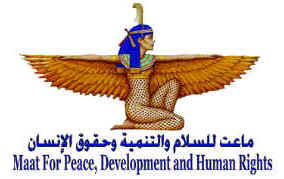
One Egyptian organisation that views these developments with surprising equanimity is Maat for Peace, Development and Human Rights. In an interview with Daily News Egypt last week, Maat's general manager, Ayman Okeil, blamed civil society organisations for the problems they face. "Some of them undertake a political pressuring role against the government, which makes it impossible to work together towards progress," he said.
The interview continued:
Q: How do you view this new draft law regulating NGOs and other independent entities? Some claimed it is going be yet another form of subordination to direct state monitoring, financial and security control?
A: I don’t agree. I think that one of the positive points of the law is that there will be a defined specialised committee approving or rejecting my projects, giving me a chance to appeal their decision before court. It also stipulates that an NGO is established with prior notification to the Ministry of Solidarity, which eases bureaucratic procedures. As for the part where we have to submit to monitoring, I don’t see a problem as long as I have nothing to hide. I mean, before that NGOs were oppressed and denied authorisations without knowing "who" was behind it, and we knew it was National Security. Now things will be on the table, with clearly stated reasons for the rejection.
Maat – named after the ancient Egyptian goddess of truth and justice – works closely with a controversial Norwegian-based organisation, the Global Network for Rights and Development (GNRD) and the Swiss-based International Institute for Peace Justice and Human Rights (IIPJHR). These three formed a "joint observer mission" for last year's presidential election which legitimised Sisi's seizure of power in Egypt and produced an enthusiastic report:
"The Egyptian people have experienced a unique process toward democratic transition, and despite the fact that minor errors and inaccuracies occurred, these do not shed a negative light on the overall results of the electoral process ...
"The Joint Mission was honoured to be a part of the 2014 Egyptian Presidential Election and contribute to promoting its transparency, integrity, and success. The Joint Mission expresses its hope that these contributions will support Egypt’s development and a smooth transition to democracy. We wish success to Egypt, being one of the most influential countries in the Middle East, and commend their achievements thus far towards a path to democracy."
One prominent member of the observer mission was GNRD's "High Commissioner for Europe", Anne Marie Lizin, a Belgian politician who has been banned from public office following a conviction for electoral malpractice.
The same three organisations were also selected by the Egyptian authorities earlier this year to monitor Egypt's forthcoming parliamentary elections – though the elections themselves have since been postponed.
Hobnobbing with Sisi
GNRD 'High Commissioner' meets Egypt's dictator
11 June 2015: Anne-Marie Lizin, the disgraced Belgian politician and "High Commissioner" of the Global Network for Rights and Development (GNRD) was in Cairo recently, hobnobbing with President Sisi. She seems to have been so thrilled by her handshake with the Egyptian dictator that she posted a photo of it on her website:
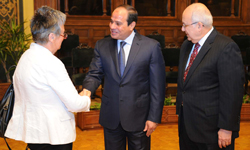
Last March, Lizin was given a suspended jail sentence and banned from public office for five years by a court in Belgium after being convicted of electoral malpractice.
Earlier, Lizin had been a key member of GNRD's observer team for the presidential election in Egypt which legitimised General Sisi's seizure of power. A subsequent report gave the election a clean bill of health:
"The Egyptian people have experienced a unique process toward democratic transition, and despite the fact that minor errors and inaccuracies occurred, these do not shed a negative light on the overall results of the electoral process".
The report continued:
"The Joint Mission was honoured to be a part of the 2014 Egyptian Presidential Election and contribute to promoting its transparency, integrity, and success. The Joint Mission expresses its hope that these contributions will support Egypt’s development and a smooth transition to democracy. We wish success to Egypt, being one of the most influential countries in the Middle East, and commend their achievements thus far towards a path to democracy."
Given the enthusiastic tone of that report it's scarcely surprising that GNRD has since become one of only five international organisations chosen by the Egyptian authorities to act as observers for parliamentary elections if/when they are eventually held.
The globetrotting Ms Lizin was also in New York last month, attending a gala dinner on GNRD's behalf. She is pictured here with three of GNRD's guests – the Belgian and Sudanese ambassadors and a representative from the Russian embassy:

A report about the gala on GNRD's website carries the misleading headline: "GNRD Sponsors New York Child Protection Gala". The article describes GNRD as a "mission sponsor", adding that the event "was sponsored also by Microsoft and Jeff Koons, the internationally renowned contemporary artist".
In fact it was the other way around: Microsoft and Jeff Koons were the main sponsors by far, and GNRD made a relatively minor contribution by paying $15,000 for a 10-seat table at the dinner. This entitled it to call itself a "Mission Sponsor" (the second-lowest of the five types of sponsorship).
GNRD was founded in 2008 by Loai Deeb, a lawyer of Palestinian origin who previously ran a fake university in Norway. His human rights organisation is also based in Norway but has branches in Austria, Belgium, Jordan, Spain, Sudan, Switzerland, the United Arab Emirates and Zambia, and recently opened an office in Britain.
It is also planning to open up in the United States, where it has been advertising for a New York based researcher/representative at $60,000 a year. Applicants should be aware that GNRD is one of the world's oddest development-and-human-rights organisations.
Combating terrorism, the GNRD way
Dodgy statistics and a draft treaty
11 June 2015:
-
During the last two years there have been 62,312 terrorist incidents worldwide which left 632,716 people dead and 1,763,802 injured.
-
Worldwide, terrorists are in full control of approximately 12.5 million square kilometers of territory.
-
Military means have limited the ability of terrorism by 7%, political solutions by 43% and security solutions by 21%.
-
Because of terrorism, poverty has increased by 26%, the ability to exploit national wealth and resources has decreased by 37%, and 9% of education has been affected negatively.
These are startling statistics – and important ones if accurate. But are they at all reliable? I suspect not, since anyone who claims such precise figures for the number of terrorist incidents and their victims probably has little grasp of the problems involved in compiling the data.
The figures quoted above were among dozens of statistics about international terrorism presented by Loai Deeb, founder and president of the Global Network for Rights and Development (GNRD), at a conference in Geneva last February (see video above).
Deeb told his audience they were the result of almost two years' work by GNRD which had "deployed thousands of field researchers around the world" and worked "in communion with all countries in the world without exception", in order to compile them.
Unfortunately though, GNRD has not explained its methodology or published the research data underlying its statistics – which means that until it does so the figures are worthless for most practical purposes.
The main aim of the Geneva conference (programme and list of "VIP guests and speakers" here) was to present GNRD's draft of a proposed international convention on counterterrorism. Copies of the 34-page document were distributed at the conference and a few individual clauses from it were read to the audience by a succession of young women in what one of those attending described as more like a beauty contest than the presentation of what GNRD hopes will become an international treaty.
Rather oddly, according to the same attendee, there was no actual discussion, debate or analysis of the document's content in open sessions at the conference. It was discussed in two closed workshops to which only "country representatives" were admitted.
No less oddly, considering GNRD is seeking international support for its proposed convention on counterterrorism, the document has not been made available for public discussion through its website (though I have recently been shown a copy by someone unconnected with GNRD).
The core proposal in GNRD's draft is to establish an International Council for Counterterrorism which, basically, would decide which individuals and organisations are to be classified as "terrorist". It would compile and maintain a worldwide list, to be reviewed annually.
The council would have 47 elected members, chosen by states which are parties to the convention, on the following basis:
African States: (13) seats
Asian States: (13) seats
Eastern European States: (6) seats
Latin America and Caribbean States: (8) seats
Western European States and others: (7) seats
Members of the UN Security Council would also be considered as full members of the Council for Counterterrorism, and its decisions would be adopted by a simple majority.
States which are parties to the convention, and observer states, would be able to nominate "individuals, groups, organisations and institutions" for listing as terrorists. Nominations must be submitted three months before a regular session of the council, with supporting information provided two months in advance.
Those designated as terrorists would be allowed two months to appeal against the decision.
Interestingly, the bureaucratic side of this would be placed in the hands of GNRD. Article 17 of the draft convention states: "The Global Network for Rights and Development shall execute the work of the General Secretariat of the Council and provide administrative facilitation for its activities."
At no point in GNRD's draft convention is there any attempt to define "terrorism", so presumably who does or does not count as a terrorist would be determined by the voting of council members.
Is this the end for GNRD?
Rights chief arrested on money-laundering charge
13 June 2015: Last February, a few months after I began investigating the Global Network for Rights and Development (GNRD), the Norwegian-based organisation issued a press release urging people to take no notice of what I was writing.
"After carefully examining all the claims made by Mr Brian Whitaker in his articles, GNRD have found that the allegations are often false and misleading and therefore GNRD is in the process of opening a legal case," it said. "Mr Whitaker’s relentless campaign against GNRD is defamatory in nature, gratuitously malicious and tantamount to criminal harassment."
I never heard from GNRD's lawyers but a few days later something else happened. There were repeated attempts to hack my social media accounts and a vicious campaign of online harassment began which lasted for more than a month. Hundreds of fake Twitter accounts posted defamatory tweets about me – fake accounts which were also being used to promote the activities of GNRD's founder and president, Loai Deeb.
They accused me of being in the pay of the Qatari government (to the tune of $50,000 a year), and of evading tax. They claimed I had been expelled from Yemen for a sexual offence. A video was posted on YouTube – purportedly the voice of a young Yemeni man who claimed I had been in Yemen during the uprising against President Saleh and had induced him to have sex with me by offering him money and employment in Qatar. Fact: my last visit to Yemen was in 2000, at the time the USS Cole was blown up.
More amusingly, they latched on to a blog post I had written criticising Sheikha Moza, the wife of Qatar's former emir, for supporting organisations which try to "cure" homosexuality. My attackers completely misunderstood the article and, mistakenly believing it praised Sheikha Moza, began citing it as evidence that I was employed by the Qatari government.
The fact that these attacks were coming from (let's say) supporters of an alleged human rights NGO naturally increased my suspicions about the true nature of GNRD. I also felt it was important to continue investigating and writing about GNRD because calling a halt at that point would have sent the wrong signal. (Readers who are unfamiliar with the story can find out about it here, where my blog posts have been compiled into a single file.)
A startling development
The questions I was asking about GNRD aroused some interest among human rights activists but not among the mainstream media – at least until yesterday when Norwegian news organisations reported a startling development: Loai Deeb had been arrested. He and GNRD are under investigation in Norway on suspicion of laundering money and handling stolen property. The amount involved is said to be US $13 million and, according to the reports, there is a financial connection with the United Arab Emirates.
The Norwegian reports say Deeb was arrested at his home on 27 May, questioned for 48 hours, charged with money laundering and released. He then returned to work and tweeted about the need for medicines to be sent to Yemen.
News of his arrest coincided with the publication of a lengthy article by Lars Backe Madsen in Dagens Næringsliv about the mysterious background of "Doctor" Deeb – a title which he apparently insists on all his staff using when they address him. Among other things, the article questions whether he actually has a doctorate. He claims to have a BA, an MA and a PhD in international law but refuses to say where he studied for them.
A strange organisation
Like most people, including genuine human rights activists, I had never heard of GNRD until last September when two men working for the organisation were arrested in Qatar. They were said to have been investigating the ill-treatment of Nepalese migrant workers there.
Their detention by the Qatari authorities was obviously unfair but I received several messages from contacts saying there was more to the story than met the eye, and it would be worth looking deeper. They suggested GNRD was a front organisation for the United Arab Emirates and that the arrested men had been caught up in a political spat between the UAE and Qatar.
Although I found no evidence that GNRD was funded directly by the UAE government, it clearly had plenty of Emirati connections. GNRD has an office there, while Deeb himself has relatives and business interests there. A trawl through GNRD's website showed it had a remarkably sympathetic view of the UAE's human rights practices – unlike Human Rights Watch and the US State Department, both of which have been highly critical. Although abuse of migrant workers is widespread in the Gulf states, the website trawl also showed Qatar was the only country that GNRD seemed eager to criticise for it.
The story then took an intriguing turn with the discovery that before he founded GNRD Deeb had set up a fake university – the Scandinavian University – at his home in Stavanger. It eventually closed down under the threat of legal action by the Norwegian authorities.
Although the story of Deeb's fake university is easily found in Norwegian newspaper archives, GNRD's February press release claimed I had got it all wrong. Supposedly I had confused the Scandinavian University with the Scandinavian Institute for Human Rights – one of numerous impressive-sounding but obscure organisations Deeb has been associated with over the years.
While writing and reporting about the Middle East I have had lots of contact with NGOs, both large and small, but almost as soon as I started looking at GNRD I began to have doubts. Much as it tried to appear like a normal NGO, there was too much about it that didn't feel right.
As I continued looking into GNRD's affairs, the words "fake" and "Deeb" continued to be paired together. Besides the use of fake Twitter accounts for publicity purposes, Deeb's own Twitter account has an unbelievable 1,842,383 followers – achieved, apparently, on the basis of just 708 tweets. A YouTube video of a speech he gave (in Arabic) last February has purportedly been viewed 1,185,984 which, as Madsen points out in his article, is only slightly less than the 1.4 million views achieved by Barack Obama with this year's State of the Union address.
Deeb is an extraordinary self-publicist, as can been seen from his
Wikipedia entry which is flagged with a note saying:
"This article has multiple issues ... This article contains content that is written like an advertisement [... and] needs additional citations for verification. This article is an autobiography or has been extensively edited by the subject or an institution related to the subject."
GNRD's activities
But what does GNRD actually do? Its website gives the impression of a busy and active organisation. There are lots of photographs of Loai Deeb looking important and signing agreements with other organisations. Much of the activity reported on the website is quite bland and uncontroversial – like its current campaign on children's "Right to Play" – and rarely involves anything but the mildest criticism of governments.
A lot of the "news" on GNRD's website is about meetings hosted by other organisations which GNRD staff have attended, while other reports are about meetings held by GNRD, often on the sidelines of UN or European Parliament activities.
One recent news item says GNRD helped in the aftermath of the Nepal earthquake but is rather vague about it. It says GNRD helped with collecting and distributing relief materials, but there is nothing to indicate the scale or extent of this help.
During the last few years GNRD has sent observer missions to elections in Algeria, Jordan, Tunisia and Egypt, as well as the independence referendum in South Sudan, and published reports about them. The report on Sisi's election to the Egyptian presidency was surprisingly enthusiastic.
Last November it flew various Yemeni political figures to Brussels for a conference which Deeb hailed as "a real opportunity to achieve an all-inclusive national reconciliation". Needless to say (especially since the UN had been trying for months to achieve the same thing), it failed and, as I wrote at the time, it was difficult to see any purpose in the Brussels conference beyond GNRD's self-aggrandisement.
Another GNRD campaign involves posting photos on Twitter of people holding placards that say "#ActAgainstTerrrorism" (a sentiment few would disagree with). This follows on from a GNRD conference on counterterrorism in February which was attended by 200 people and held in one of Geneva's most expensive hotels. Attendees at the conference were presented with a 34-page draft of an international convention on counterterrorism which had been produced by GNRD.
GNRD had been working on the draft for more than a year and has clearly invested a lot of effort and money in producing it. There seems to be some kind of political motive behind this, but as yet I'm not sure what it is.
One frequent comment from those who have contact with GNRD is that it doesn't seem to be short of money. Apart from the lavish conferences, it is said to employ more than 100 staff worldwide. Earlier this month it announced the opening of a London office and has also been advertising for a researcher/representative to be based in New York (at a salary of $60,000 a year).
Several of GNRD's staff are registered for lobbying purposes at the European Parliament in Brussels. In February this year, after several years of trying, GNRD was granted consultative status at the United Nations, mainly at the behest of Sudan, which "highlighted the excellent work of the organisation" according to
a report of the meeting (page 21). This was not without controversy, however: the US sought to delay a vote on the grounds that GNRD "was promulgating false information on its website about the participation of the United States in one of its events". Nevertheless, the vote went ahead with Azerbaijan, Burundi, China, Cuba, Guinea, India, Iran, Mauritania, Nicaragua, Pakistan, Russia, South Africa, Sudan, Uruguay, Venezuela supporting GNRD's acceptance and only the US and Israel opposing it.
The end?
The exact nature of the money-laundering charges remains to be seen; details will no doubt emerge as the case progresses. But regardless of what happens on the legal front, it is difficult to see how GNRD can survive. Whatever credibility it might have had has already been destroyed by the man who created it.
A junket in Geneva
... and GNRD's weird plan to fight terror
15 June 2015: The five-star Hotel President Wilson stands on the shores of Lake Geneva, offering "exceptional" views of Mont Blanc, and its three restaurants are said to provide "unparalleled culinary delights". Room prices in the Wilson hotel start at around £250 a night, ranging up to £52,000 a night for the Royal Penthouse Suite.
On February 15, some 200 delegates from 67 countries began arriving here for a two-day conference entitled: “Balancing counter-terrorism and human rights: Challenges and opportunities”.
The event was hosted by the Global Network for Rights and Development (GNRD), an obscure but well-funded organisation which is based in Norway but has numerous links to the United Arab Emirates.
Four months later, however, GNRD and its autocratic founder-president, Loai Deeb, stand accused by the Norwegian authorities of money laundering. The amount involved is said to be $13 million – money which allegedly came from the UAE. Following his arrest, Deeb left Norway for the UAE, allegedly to attend business meetings. His lawyer, Kjell Brygfjell, denied that he had fled and insisted he would be returning to Norway shortly,
All expenses paid
The Geneva conference was almost certainly the biggest and most expensive gathering organised by GNRD in its seven-year history. GNRD clearly attached great importance to it, having spend (by its own account) two years on the preparations.
British MEP Julie Ward was among those flown in for a panel discussion at the conference. GNRD paid for her £525 business class ticket from Manchester to Geneva via Brussels, and provided her with two nights' accommodation at the Wilson.
Assuming the 40-or-so people listed alongside Ms Ward in the conference programme as "VIP guests and speakers" received similar treatment, the cost of getting them all to the event was probably in excess of £50,000. On top of that, of course, there was the not inconsiderable cost of hiring the Wilson's "renowned" conference facilities and GNRD's own administrative and organisational costs.
Besides questions about where the money came from (since GNRD doesn't disclose its sources of funding), there are several puzzling aspects to this event and trying to make sense of them may eventually lead to a better understanding of GNRD more generally.
An 'out-of-the-ordinary' organisation
GNRD was established in 2008 and, in the words of its website, "uses out-of-the-ordinary and unique approaches to achieve real changes in the field of human rights and development". Its founder, Loai Deeb, is a Norwegian citizen of Palestinian origin who speaks English with some difficulty. He claims to have a doctorate in international law but refuses to say where he obtained the degree. Before setting up GNRD he was head of a fake university in Stavanger which closed following threats of legal action by the Norwegian authorities.
Nevertheless, GNRD expanded rapidly after its inception, opening offices Belgium, Switzerland, Spain, Sudan, Jordan, Britain and the UAE, and hiring more than 100 staff. Despite its founder's penchant for fakery, it also passed a major milestone a few days before the Geneva conference, winning consultative status at the UN – mainly through support from Sudan.
For the first few years of its existence GNRD had shown little interest in counter-terrorism but in November 2013 it launched an initiative "aimed at establishing [a] new international mechanism, guaranteeing human rights in countering terrorism". The initiative, it said, "involves a series of events, conferences, workshops, research and official consultations on the matter and is designed to result in an international convention and the establishment of an intergovernmental overseeing body".
The purpose of this overseeing body, it explained, would be to ensure a common position worldwide over the labelling of suspected terrorists and terrorist organisations – thus preventing "international tensions and conflicts that result from differences in listing terrorists and terrorist organisations".
In doing this, GNRD was lighting a well-known problem – one that others who have far more experience than GNRD have tried to solve without success. International differences arise partly because there is no universally agreed definition of terrorism but also because governments often find it useful to apply the terrorism label to their political enemies, regardless of whether there is good evidence to support that designation.
According to advance publicity for the Geneva conference, GNRD's draft international convention (including its plan for a body to decide who is or is not a terrorist) was to be "the main topic of discussion". But it didn't turn out that way. Discussion of the draft's content was confined to two closed workshops which only "country representatives" were allowed to attend. While the closed workshops were taking place, ordinary delegates were invited to discuss such general topics as “Violent Radicalisation and the Challenges Of Foreign Fighters” and “Data Privacy, Surveillance and Counter Terrorism”. One obvious effect of this was to restrict open debate or criticism of the draft.
Copying the Human Rights Council
The draft's core proposal was to set up a new body under UN auspices – the International Council for Counterterrorism – to decide which individuals and organisations should be classified as "terrorist" and maintain an official worldwide list.
One intriguing feature of GNRD's plan for an in international counterterrorism council is that its proposed structure bore a striking resemblance to one of the UN's most ineffectual bodies – the Human Rights Council.
The counterterrorism council envisaged by GNRD would have 47 elected members, chosen on a regional basis with 13 seats for African states, 13 for Asian states, six for Eastern European States, eight for Latin America and Caribbean States, and seven for Western European States and others.
It's presumably not by coincidence that the UN Human Rights Council also has 47 elected members, chosen on a regional basis with 13 seats for African states, etc, etc.
There are textual similarities too. For example, GNRD's proposed rules for non-member states to report terrorism to the counterterrorism council (Article 29) is an adaptation of the rules for reporting rights abuses to the Human Rights Council. One of the HRC's rules, for instance, says complaints must be "not exclusively based on reports disseminated by mass media". GNRD's Article 29 (3e) says they "must not be based entirely on reports issued by the media".
Given that the Human Rights Council has proved so ineffectual, you might be wondering why anyone would want to create a new body modelled on it. But that depends on how you look at it. From the point of view of rights abusers the HRC has been a resounding success. Its structure has helped to minimise what authoritarian regimes see as western interference in their abusive practices.
In a similar way, the structure of the counterterrorism council (as set out by GNRD) would give Asian and African states more influence over counterterrorism efforts and reduce the influence of western states, especially the US.
Political motivations?
There is a political background here which may shed some light on the motivations behind GNRD's proposal. Various Arab regimes have become disgruntled at the reluctance of other countries (most notably western powers) to treat local opposition movements as terrorists and then crack down on members who live and agitate in exile.
This came to a head in 2013 when General Sisi overthrew Egypt's Muslim Brotherhood president, Mohamed Morsi and, with backing from several Gulf states (Saudi Arabia and the UAE in particular), declared the Brotherhood to be a terrorist organisation. Under pressure from the Saudis to ban Muslim Brotherhood activities in Britain, prime minister David Cameron agreed to order an investigation but in the end took no further action.
Last November the UAE issued a "blacklist" of 82 organisations which it claimed were engaged in terrorism. Some of the names on the list were greeted with scepticism outside the UAE, but the compilation of this list shows that the UAE and GNRD were at least thinking along similar lines.
However, there may be a further dimension to GNRD's plan for a counterterrorism council. For almost 10 years, efforts have been under way at the UN to negotiate a "Comprehensive Convention on Terrorism", but without much progress. A history of the first few years of negotiations is here, and an early draft of the convention is here.
One major problem has been the lack of international agreement on a definition of terrorism. GNRD's draft convention sidesteps this completely by not attempting a definition. Designation as a terrorist, as set out in GNRD's draft, seems to depend not so much on whether individuals and organisations fit specified criteria as on the voting patterns of counterterrorism council members. It is easy to see how this could lead to bargaining and trade-offs between member countries over who to include in the list: it might well end up as the FIFA of counterterrorism.
An ego trip?
After ploughing through GNRD's draft (full text here), my own impression is that it is riddled with flaws and is basically a non-starter in terms of improving the way terrorism is dealt with at an international level. I could be wrong, of course, and I would welcome views from any experts on international law or counterterrorism.
But here's another puzzle. If GNRD's proposal is really as feeble as I think it is, did Loai Deeb seriously believe he could persuade the world (beyond a few Arab autocrats) of its merits? Maybe he did. Or maybe it was enough just to have his anonymous backers funding him on a gigantic ego trip.
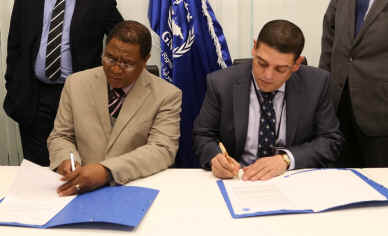
Loai Deeb (right) signs a memorandum of understanding with COMESA, the Common Market for Eastern and Southern Africa
Loai Deeb and his 'collaborators'
Universities and others were fooled into backing a faker
16 June 2015: Just two months ago, the head of cultural studies at Stavanger university in Norway signed a cooperation agreement with an obscure but very well funded human rights organisation – the Global Network for Rights and Development (GNRD).
According to GNRD, which is also based in Stavanger, the agreement allowed "high-calibre graduates to acquire rewarding and relevant work experience in human rights and development fields through internships at GNRD".
A similar agreement had been signed with GNRD a month earlier by the Centre for Peace Studies at another Norwegian university, in Tromsø.
Had either university bothered to carry out some basic checks through Google they would probably not have signed the agreements:
-
GNRD has connections with the United Arab Emirates and portrays the UAE's human rights policies in an undeservedly favourable light.
-
Its founder and president, Loai Deeb, previously set up a fake university in Norway which closed under threats of legal action from the Norwegian authorities.
-
Deeb also uses hundreds of fake Twitter accounts to promote himself and his activities.
-
GNRD's "High Commissioner for Europe" is a discredited Belgian politician with a conviction for electoral malpractice.
Last Friday, however, new questions arose about the activities of Deeb's strange human rights organisation. It emerged that GNRD was at the centre of a money-laundering investigation launched by the Norwegian authorities and that Deeb had been arrested. The amount of money involved is said to be $13 million.
Stavanger university has now decided that GNRD does not "meet the requirements" for partnership and has cancelled the agreement.
Universities were not the only institutions fooled by GNRD. Others include the United Nations, the European Parliament and the African Union. Even before the money-laundering case (which has yet to be tested in court) there were plenty of reasons to stay well clear of Deeb and GNRD. Readers unfamiliar with the background can find the details here.
In the seven years since it was founded, GNRD has made a particular point of trying to associate itself with other organisations and institutions. Sometimes there were formal agreements and a signing ceremony which was photographed for GNRD's website. Developing these ties helped to build an air of credibility.
Many of its ties, though, were much less formal but GNRD exaggerated their importance. It spent a lot of time "participating" in activities organised by other groups – which often required nothing more than attending a conference or meeting and posting a report of it on the GNRD website. Again, this helped to build credibility by association and, through the website posts, created an impression of GNRD as a busy, active organisation even when it wasn't actually doing very much.
GNRD's website carries the logos of 27 "collaborators and sponsors" (scroll down to the bottom of this page). They look impressive but the names are difficult to read – which is perhaps just as well because two of them are businesses owned by Loai Deeb. They also include two hotel companies and a travel agent (presumably used by GNRD) and several NGOs in Latin America which GNRD staff have reported meeting on their travels. Almun (the Arab League Model United Nations) is included too – apparently because GNRD attended one of its events in Cairo last year.
After some digging, mainly through the news items on GNRD's website, I have compiled an alternative list of GNRD's "collaborators" which I think gives a more accurate picture of its significant relationships (apart from the obvious one with the UAE):
United Nations
In February this year, the United Nations Economic and Social Council (ECOSOC) granted GNRD consultative status. One practical benefit of this is that it allows GNRD to book rooms for meetings at the Palais des Nations in Geneva.
European Parliament
GNRD is recognised by the European Parliament and listed in the transparency register. Six GNRD staff are currently accredited for access to parliament premises.
In addition, several MEPs have jointly hosted events with GNRD. They include:
-
Eija-Riitta Korhola (Finland)
-
Mariya Gabriel (Bulgaria)
-
Afzal Khan (Britain)
-
Elly Schlein (Italy)
-
Nikki Sinclaire (Britain; now ex-MEP)
African Union
In 2013, GNRD signed a memorandum of understanding with the African Union "to facilitate the development and integration agenda" of the AU and "explore opportunities for cooperation and non-exclusive partnership".
GNRD's "High Commissioner on Africa", Joseph Chilengi, also chairs the general assembly of the AU's Economic, Social and Cultural Council (ECOSOCC). In June, Chilengi flew to Spain at GNRD's invitation to take part in an Africa Day debate.
COMESA
In January this year GNRD signed a memorandum of understanding with the Common Market for Eastern and Southern Africa (COMESA) "for strengthening cooperation between the two parties to facilitate the development and integration agenda of the COMESA". GNRD was also given a consultancy role in COMESA.
Egypt
GNRD is one of only five international organisations approved by the Sisi regime to observe Egypt's next parliamentary elections. This seems to be the result of an enthusiastic report produced after a GNRD mission observed the 2104 election which legitimised Sisi's seizure of power.
Anna Lindh Foundation
GNRD's branch in Spain is a member of the Spanish network of the Anna Lindh Foundation. GNRD's website says: "This inclusion allows GNRD to participate in the different calls for grants and activities promoted by the foundation."
University of Valencia
GNRD's Spanish branch is in Valencia and two logos for the University of Valencia are displayed on its website in the "collaborators and sponsors" section. Clicking on one logo links to the university's social science faculty, and the other to the University of Valencia General Foundation.
It is unclear whether GNRD has a formal agreement with the university but articles on GNRD's website claim it has the university's support.
Last October GNRD held an art exhibition on the social science faculty's premises. An administrative note by GNRD says it was sponsored by the faculty and artist Antoni Camaró. The note continues: "We received a very high turnout; the room exhibition was overcrowded. We succeeded in establishing a partnership with the Social Sciences University and its staff. They are very receptive and open to organising more projects together with GNRD."
In December, a GNRD event was held in the law faculty, "in collaboration with Jorge Cardona, Professor of International Public Law".
In April, GNRD and Red Acoge (a Spanish NGO) organised "a presentation on the latest research into the portrayal and depiction of immigrants in the mass media" in the university's social science faculty.
A further GNRD event on university premises took place in May and, according to GNRD, "vice president for culture of Valencia University, Antonio Ariño, announced academic support given to GNRD" for organising it.
Less than a week later, yet another GNRD event in Valencia was "supported by Valencia University through its vice rector, Antonio Ariño".
Nakhweh (Yemen)
Last October GNRD, in conjunction with Yemen's National Center for Human Rights and Democratic Development (Nakhweh), organised an expensive but futile conference in Brussels aimed (in Deeb's words) at achieving "an all-inclusive national reconciliation" for Yemen. GNRD's website reported that it ended "successfully" and was "widely expected to immediately improve the Yemeni political climate and facilitate greater security and stability throughout Yemen". It didn't.
The head of Nakhweh, according to the Yemen Times, is Ahmed Saleh al-Essi who became controversial in Yemen both for his business activities and (until recently) his domination over the Yemeni Football Association.
Haytham Manna
Haytham Manna, director of the Scandinavian Institute for Human Rights (SIHR), has attended and spoken at various GNRD events. GNRD chief Loai Deeb was a founder of SIHR and remained on its board until 2013. Manna, a Syrian living in exile, has also acted as spokesperson for the Arab Commission for Human Rights the Syrian National Coordination Committee for Democratic Change.
International Institute for Peace, Justice and Human Rights
GNRD works very closely with the Swiss-based International Institute for Peace, Justice and Human Rights (IIPJHR). Both organisations share an office address in Geneva and almost all the activities reported on IIPJHR's website are carried out in conjunction with GNRD.
When I first looked at IIPJHR in January, the "who we are" section of its website had been copied directly from the same section of GNRD's website – without even bothering to change the organisation's name. This was changed after I pointed it out in a blog post.
Like GNRD, IIPJHR is one of the five international organisations approved by the Sisi regime to observe Egypt's parliamentary elections.
Church of Scientology
This may be a case of GNRD not properly checking out the organisations it collaborates with. In February, GNRD staff attended "human rights training workshops" in London provided by a Scientology front organisation.
A few days later, GNRD staff celebrated International Women's Day jointly with the Scientologists at Fitzroy House – a museum dedicated to the memory of Scientology's founder, L Ron Hubbard.
GNRD 'to sue Norway for $2 billion'
Mysterious rights group denounces police raid
17 June 2015: The Global Network for Rights and Development, the strange but well-funded human rights organisation raided by Norwegian police on suspicion of money-laundering, issued a blustering press release in Arabic yesterday denouncing the police action as "unjustified and irresponsible" and threatening to sue Norway for $2 billion compensation.
In its statement, GNRD said "the volume of lying and defamation" directed against it was clear evidence of an organised campaign "run from a state known for its gross human rights violations" [presumably Qatar].
Elaborating on this conspiracy theory, and apparently referring to my blog posts, the press release said:
"What is being said about [GNRD's] sources of funding and its connections with any side is completely untrue and ... the source of the news is a journalist working according to the agenda of that known state and is being passed on by a network of journalists which that state established to attack rights organisations ... and improve its image.
"Regarding its president,[GNRD] confirmed that Dr Loai Deeb has been following up what happened with the Norwegian authorities and the legal team, and after that, accordance with his pre-arranged work programme, he travelled to take part in the African countries' economic summit in Sharm el-Sheikh then to Dubai to follow up the work of the network's office there, then returned in normal fashion to Norway."
Following his arrest in Stavanger, Deeb had travelled from Norway to the United Arab Emirates, raising doubts about whether he would return.
The statement continued:
"For his part, an official spokesman for the International Network for Rights and Development stressed that what the Norwegian police did was unjustified and irresponsible, and contrary to norms and international laws and what Norway says about it in international forums and United Nations platforms.
"He said the International Network for Rights and Development had begun urgent action to demand an official apology from the Norwegian authorities and [claim] compensation amounting to six billion Norwegian kroner – that is, approximately one billion dollars."
Six billion kroner is actually rather less than that – about $780 million – but the statement added that GNRD branches in other countries would also be suing Norway, making a total damages claim of "up to $2 billion".
Details of the money-laundering investigation are still scarce but Norwegian media have been publishing a few titbits.
The financial newspaper Dagens Næringsliv says the amount of money in the laundering case is around $13 million, most of which arrived in Norway since autumn last year.
Three Emirati companies connected with GNRD chief Loai Deeb – Deeb Consulting, Advanced Security Technology and Lana Interiors – are described as central to the investigation.
It is also alleged that large sums were received by Deeb personally, as well as GNRD. He is reported to have set up several new companies in Norway recently, some of which include other GNRD figures on their boards.
According to Stavanger Aftenblad, Deeb bought two properties in Norway last year for a total value of 12.3 million kroner ($1.6 million) and paid for them in full without taking out a mortgage.
It has also been reported that Deeb's personal income, which had been around $25,000 a year until 2012, suddenly leapt to $600,000 in 2013.
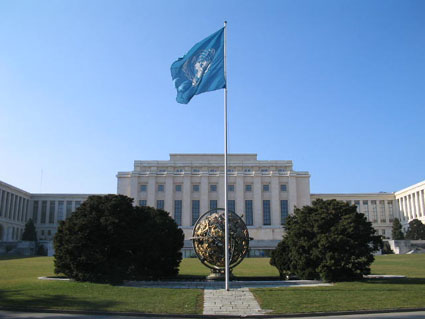
The UN's Geneva headquarters. GNRD will be holding two meetings there next week
GNRD to host meetings at UN
Suspect organisation books rooms in Palais des Nations
19 June 2015: The Global Network for Rights and Development – the organisation at the centre of a $13 million money-laundering investigation by Norwegian police – will be making use of its newly-acquired UN "consultative status" to host two meetings at the Palais des Nations in Geneva next week.
On Monday afternoon it will be holding a meeting on UN premises about women's rights. On Thursday it will be holding a lunchtime meeting entitles "Counter-terrorism and human rights".
Both meetings are being held in connection with the 29th session of the UN Human Rights Council. Having consultative status allows GNRD to organise "parallel events" on issues related to the council's work. It also allows GNRD to ...
-
Attend and observe all proceedings of the Council with the
exception of the Council deliberations under the Complaints
Procedure -
Submit written statements to the Human Rights Council
-
Make oral interventions to the Human Rights Council
-
Participate in debates, interactive dialogues, panel discussions
and informal meetings
GNRD was granted consultative status in February this year, in controversial circumstances and after several years of trying. Sudan urged its acceptance, highlighting "the excellent work of the organisation" according to a report of the discussion (page 21). The US sought to delay a vote on the grounds that GNRD "was promulgating false information on its website" but the vote went ahead with Azerbaijan, Burundi, China, Cuba, Guinea, India, Iran, Mauritania, Nicaragua, Pakistan, Russia, South Africa, Sudan, Uruguay, Venezuela supporting GNRD's acceptance and only the US and Israel opposing it.
Although this happened before the money-laundering allegations became public (and it would be wrong to presume that GNRD is guilty on that score), well-documented information about other aspects of GNRD and its founder-president Loai Deeb suggests the UN ought to reconsider its consultative status.

Unlikely human rights benefactor: Mohammed Dahlan, former head of "preventive security" in Gaza
Dahlan said to be funding GNRD
Money trail points to Gaza's feared former security chief
20 June 2015: Multiple sources have identified Mohammed Dahlan, the former head of Palestinian “preventive security” in Gaza, as a provider of funds for the Global Network for Rights and Development (GNRD) – the “human rights” organisation at the centre of $13 million money-laundering investigation by Norwegian police.
At first sight, the idea of Dahlan – who is said to have a personal fortune of $120 million – as a human rights benefactor seems utterly bizarre but, if true, raises further questions about the nature and purpose of GNRD.
A profile of Dahlan published by the Electronic Intifada website in 2006 said of him:
“Throughout the years, Dahlan’s forces were involved in acts of violence and intimidation against critics, journalists and members of opposition groups, primarily from Hamas, imprisoning them without formal charges for weeks or months at a time. A number of prisoners died under suspicious circumstances during or after interrogation by Dahlan’s forces.
“In 1996, Dahlan’s troops were involved in mass arbitrary arrests of opponents of Fatah. In the aftermath of the February-March suicide bombings in Israel, an estimated 2,000 people were rounded up, often arbitrarily. Most of those detained were never charged with a criminal offence or put on trial. Torture and ill-treatment by his forces occurred regularly during interrogation and led to a number of deaths.”
Dahlan has long been beset by allegations of corruption. The Electronic Intifada describes him as implicated in financial scandals as well as human rights violations and, on the other side of the political divide, the Jerusalem Center for Public Affairs (an Israeli organisation) says:
“Palestinian documents captured in 2002 revealed Dahlan’s involvement in major racketeering, including revenues from cigarettes, cement, and the collection of illegal crossing fees.”
Earlier this year there was an attempt to try him for alleged misuse of $17 million in expenses but a Palestinian court ruled the charges “inadmissible”. Dahlan’s lawyer hailed the verdict as “a great victory for the defence but also for the political future of Palestine", praising the “courage” of the judges in demonstrating the independence of the Palestinian judiciary.
If it’s true that Dahlan has been funding GNRD, this could explain why Norwegian police suspect GNRD and Loai Deeb, its founder-president, of money-laundering. According to police, the money they are investigating is “the proceeds of crime”, and this would not be the case if GNRD were simply being funded by foreign governments, even by a circuitous route. Funding by Dahlan would be a different matter if it involved ill-gotten gains.
Geneva conference
Last February, GNRD held a strange but hugely expensive conference in Geneva on human rights and counter-terrorism – an event for which it claims to have spent two years preparing.
Taking advantage of its recently-acquired consultative status at the United Nations, GNRD is due to hold a follow-up meeting on the same topic next week, but this time at the UN’s Geneva headquarters, on the sidelines of the Human Rights Council’s 29th session.
According to a French-language publication, Afrique Asie, the February conference was financed notably by businessmen who included Mohammed Dahlan.
Earlier this week a paragraph in Daily News Egypt referred to links between GNRD president Loai Deeb and Dahlan. It didn’t name Dahlan but gave plenty of clues:
"According to an article by the Yemen Economist, Deeb has close ties with a former leader in the Palestinian Fatah movement, who is in turn a close advisor of Abu Dhabi’s crown prince, Prince Mohammed bin Zayed Al-Nahyan."
An article on the Lebanese news website al-Akhbar, published last year, describes Dahlan – who left Palestine under a cloud – as “currently a security adviser for Abu Dhabi Crown Prince Mohammed bin Zayed”. [Hat tip to Toralf Sandø of Aftenbladet for spotting that.]
Dahlan's battle with Abbas
This still leaves the question of why Dahlan would choose – if that’s what he did – to fund a human rights organisation. Is he feeling remorse?
Probably he is not, but the explanation may lie in an incident three years ago when some documents were leaked to several Palestinian news websites. They also appeared briefly on the website of the Palestinian Authority’s news agency, Wafa, but were hastily deleted.
The official line was that the documents were fakes and that hackers had broken into Wafa’s website and planted them there. However, Palestinian sources cited by the Jerusalem Post said the documents had been circulated by Dahlan and Muhammad Rashid (formerly Yasser Arafat’s financial adviser) in pursuit of their rivalry with Mahmoud Abbas, the Palestinian president.
According to the Jerusalem Post, the documents were said to be part of a classified report prepared by the PA’s external security department and named GNRD as a vehicle for influencing public opinion worldwide and gathering intelligence.
The Jerusalem Post’s article continued:
The plan envisages using GNRD as a front for the establishment of an “effective and credible international human rights group that would be based in Geneva and whose goal would be to defend Palestinian causes” and collect information.
The cost of the project is estimated at hundreds of millions of dollars.
The report points out the important role of NGOs’ in shaping public opinion and affecting decision-making worldwide.
“These NGOs have a green card to enter any place in the world and operate freely under various pretexts,” the report said. “But we in Palestine are lacking many elements of power.”
The report claimed that many Western countries, including France, Britain and the US, have been using human rights organisations as a “striking arm” to affect policies around the world and remove governments from power. The report referred specifically to Amnesty International and Human Rights Watch and claims that they are funded and backed by Britain and the US, respectively.
The report recommended that the PA set up a similar “striking arm” that would operate out of Geneva and have representation in at least 50 countries. It said that the main mission would be to gather intelligence with the help of Western nationals.
If GNRD was originally intended as an official (but secret) Palestinian front organisation, how do we account for the claims that it is now funded by Dahlan rather than the Palestinian Authority?
An Israeli news report yesterday provided a rather cryptic clue. “Deeb's organisation,” it said, “became a boxing ring in the struggle between Abbas and Dahlan.” The suggestion is that Deeb, who hails from Gaza, eventually sided with Dahlan – for reasons which are as yet unknown.
Connections with Dahlan do not of course negate the previously-reported Emirati influences in GNRD; in fact they strengthen them. Unlike most international human rights organisations GNRD is allowed to have an office in the UAE, while Deeb has family and business interests there. The involvement of Dahlan, with his connections to the Emirati regime, would add a further string.
Winning friends, gaining influence
GNRD's development has broadly followed the path outlined in the leaked Palestinian documents. Although based in Norway rather than Geneva, it has been very active in Geneva and now – having acquired UN recognition last February – it looks set to become more involved there.
Norway, it could be argued, also provides a good alternative base. Its international reputation as a peaceful, liberal country means an organisation based there is more likely to be trusted, and less likely to have its credentials questioned, than one based – say – in the Middle East.
As a bonus, GNRD has been active in Brussels too, building contacts and influence in the European parliament.
GNRD doesn't – yet – have formal representation in 50 countries but it has expanded rapidly, opening offices in Austria, Belgium, Britain,Jordan, Spain, Sudan, Switzerland, the United Arab Emirates and Zambia. It has also recently been advertising for a researcher/representative to be based in New York, at a salary of
$60,000 a year.
Most (but not all) of the "human rights" activities promoted on GNRD's website seem bland and uncontroversial – deliberately so, perhaps. One recent example is its campaign on children's "Right to Play". In contrast to Human Rights Watch and Amnesty International, GNRD generally avoids direct public criticism of governments over human rights abuses (with the specific exceptions of Qatar and Israel). This, again, maximises its opportunities for cooperation and acceptance.
Coupled with its strenuous efforts to sign "cooperation" agreements with respected organisations and institutions, all this appears to be part of a calculated long-term strategy to win acceptance and ultimately gain influence. Millions of dollars have been poured into that process.
The Palestinian documents also spoke of an intelligence-gathering role but it remains to be seen whether GNRD has engaged in that. However, there was an interesting proposal in the draft
International Convention on Counterterrorism circulated by GNRD at its conference in Geneva last February.
The draft outlined a plan to set up an International Council for Counterterrorism under UN auspices which would take responsibility for deciding – on a worldwide basis – which individuals and groups should be designated as terrorists.
Article 17 of GNRD's draft said:
"The Global Network for Rights and Development shall execute the work of the General Secretariat of the Council and provide administrative facilitation for its activities."
In other words, GNRD – rather than the UN – would take charge of administering what was envisaged as becoming the main international counter-terrorism body. That, in turn, would have meant giving GNRD access to a great deal of information about terrorist activities all over the world.
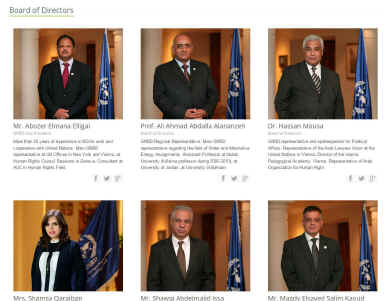
A section from one of the deleted web pages
Gone but not forgotten
Website deletions by "money laundering" rights group
21 June 2015: Amid growing media interest in the mysterious affairs of GNRD (the Global Network for Rights and Development), various items have begun disappearing from its website.
Norwegian media have been investigating GNRD following a police raid on its headquarters in Stavanger and the arrest of its founder-president, Loai Deeb. Deeb and GNRD are suspected of money laundering and police say the money involved – some $13 million which came mainly via the United Arab Emirates – is the proceeds of crime.
Although the Norwegian police have given no further details, there have been repeated claims that Mohammed Dahlan, the corrupt former chief of Palestinian preventive security in Gaza, was funding at least some of GNRD's "human rights" activities. Both GNRD and Dahlan have connections with the Emirates.
Two items of interest to media investigators have been deleted from GNRD's website during the last few days:
-
One is the "Our Team" page which contained biographical notes about the organisation's board members and other key figures, along with their photographs.
-
The other is a collection of logos indicating GNRD's "collaborators and sponsors" which appeared at the bottom of the website's home page.
A news item which reported the signing of an agreement between GNRD and the Centre for Peace Studies at Tromsø university has also disappeared, though it is not known when this was deleted.
The information is not lost, however. Snapshots of the pages taken before the deletions were made can still be found in the Wayback Machine's archive. The "Our Team" page can be seen here, the previous version of the home page is here, and the Tromsø university item is here.
The Tromsø item may have been deleted because of complaints from the university. The Peace Studies centre in Tromsø signed a cooperation agreement with GNRD last March but later rescinded it, having become suspicious after seeing how GNRD was publicising the relationship.
Christine Smith-Simonsen, head of the Peace Studies centre, told the Norwegian Broadcasting Corporation: "It seemed like they were looking to secure legitimacy through contact with our university. Then we realised that everything was not as it should be."
The collection of 27 "collaborators and sponsors" (including Tromsø university) displayed on GNRD's home page was very misleading, as I explained in a blog post last week. They included businesses owned by Loai Deeb, two hotel companies and a travel agent (presumably used by GNRD) plus several NGOs in Latin America which GNRD staff have reported meeting on their travels.
GNRD's website still has a page headed "Our Collaborators" which refers to its consultative status at the United Nations, its recognition by the European Parliament and its "memorandum of understanding" with the African Union. The page also displays logos for ALMUN (the Arab League Model United Nations) and GNRD's own youth section.
Last month GNRD issued a press release to celebrate Information Society Day. It said: "The dream and the goal of universal human rights can only be achieved by ensuring equality of connectivity and access to information and news. This is attainable through the exercise of cultural and political will in a manner that strengthens our common values."
GNRD and Palestine
Controversial rights group claims to be neutral and impartial
23 June 2015: The Global Network for Rights and Development – the organisation at the centre of a $13 million money-laundering investigation by Norwegian police – declares itself to be an international NGO which is "neutral and impartial". It has made strenuous efforts to win acceptance as a normal, mainstream human rights organisation and, where the UN and the European Parliament are concerned, it has largely succeeded in that.
But there are oddities too. GNRD is clearly well-funded but it doesn't say where the money comes from. In some respects it is also far from impartial. It obviously has a soft spot for the Sisi regime in Egypt and, unlike Human Rights Watch and the US State Department, it promotes a very favourable view of human rights in the United Arab Emirates.
The Emirati connections have been much discussed but in the light of reports that GNRD has been funded – at least partly – by Mohammed Dahlan, the former head of Palestinian "preventive security" in Gaza, I decided to take a look at its views on Palestine.
Loai Deeb, the founder and president of GNRD, is now a Norwegian citizen but is of Palestinian origin. According to his profile on Wikipedia, he was born in Rafah, on the Gaza-Egypt border, and according to a recently-deleted section of the Wikipedia entry, he grew up in Gaza as a rebel:
"He founded a students union that called for the Palestinian history to be taught in Palestinian schools. As a result, especial units from the Israeli army abducted him outside his school at the age of 14 years.
"He was interrogated for more than six months, during which he did not make any confession. Israeli press addressed his case in its coverage as a child subjected to torture. He was transferred to a court, which jailed him for four years and 6 months under the so-called Israeli (Tamir) law."
These early experiences might seem relevant – important, even – to his later role as head of a rights organisation. But when a biographical note about Deeb was posted on GNRD's website it made no mention of Palestine at all
Dr. Loai Mohammed Deeb
GNRD President
PhD in International Law. 15 years of activities in the field of human rights. Member of many lawyers associations, such as in Cairo, Paris, London. Fellow of the Academy of European Law in Germany. Member of the Union for the ICC in Lahaye "Den Haag".
(This information, like parts of his Wikipedia entry, is also now deleted. It was on a page showing profiles and photographs of GNRD staff which disappeared a few days ago along with material about GNRD's "collaborators and sponsors" – apparently to hamper investigation by journalists in the midst of increased media interest. However, cached copies can still be found in the Wayback Machine's archive.)
Palestine on GNRD's website
A perusal of GNRD's website suggests an organisation that is certainly concerned about Palestine – as most rights groups are – but not especially preoccupied by it.
For example, a Google search of the website shows 44 pages containing the word "Palestine" (and 16 containing the word "Israel"). This is a tiny proportion on a website of 2,500 pages or more. Among the 44 pages, some of the "Palestine" mentions are just incidental, and some pages are duplicated in English and French. One of the pages dealing specifically with Palestine has a news item that begins:
"In Gaza, and for the first time, GNRD youth groups kindly visited Saint Porphyrius Church on Sunday 20-4-2014 at 1:00pm (Easter Day). GNRD members carried white flowers with them to symbolise peace and religious tolerance between Muslims and Christians in Palestine ... "
Another item is headed: "UN agency receives 11 million euros from European Commission to help Palestine refugees."
There's also an undated report which gives a fairly bland account of GNRD's youth activities in the West Bank.
Last year GNRD issued a country-by-country league table of human rights which it deleted after being mocked on social media for giving an unbelievably high ranking to the UAE. But where Israel and Palestine were concerned, its rankings didn't sound unreasonable. It said:
"A large number of alarming reports from Palestine, Israel, Ukraine, Iraq, Libya, Syria and Sudan have resulted in notable shifts in the rankings. Thus, Israel went down 10 places, to the 64th position, owing to a significant decline in the rights of foreigners and the right of movement; Palestine went down 14, to 107th position ..."
Overall, GNRD's position on Palestine, as judged from its website, doesn't seem particularly strident or contentious. But there's a small crack in this facade. The Google search also throws up a document that doesn't seem to be linked in to the main website. It's in a folder marked "userfiles" and it reveals a much closer involvement in Palestinian affairs, with a very different tone.
The document, entitled "Report on Israeli Enforcement of Buffer Zone Area in the Gaza Strip: Most Important Violations Resulting from the Buffer Zone", was produced by GNRD "in collaboration" with the Ramallah-based Al-Dameer Association for Human Rights. The report, which was later distributed to the UN Human Rights Council, can also be viewed on Al-Dameer's website.
Older cached versions of the now-deleted staff list show that Khalil Abu Shammala, Al-Dameer's director, was also once a board member of GNRD, though he seems to have left late last year or early this year.
Of course, GNRD and Al-Dameer were perfectly entitled to produce a critical report on the buffer zone. The point, though, is that it seems to have been something GNRD was not particularly keen to draw attention to on its website.
Campaign against war criminals
Aside from his GNRD activities, Loai Deeb was one of the founders of the International Coalition Against War Criminals (ICAWC). This sounds like a worthy cause – except that all the "war criminals" it pursues seem to have the same nationality. In 2009, aided by a group of Norwegian lawyers, it attempted bring war crimes charges against three Israeli politicians – Ehud Olmert, Tzipi Livni and Ehud Barak – together with seven Israeli military commanders. One of the lawyers involved, Kjell Brygfjeld, is now representing Deeb in the money-laundering case.
NGO Monitor (an Israeli organisation) makes a number of complaints about GNRD's Palestine-related activities. It notes that in 2013 GNRD organised a side event at the UN Human Rights Council on "Israeli violations of human rights". The relevant page has since been deleted from GNRD's website but a snapshot has been preserved in the Wayback Machine archive, here, and it's easy to see why NGO Monitor didn't like it: it's very critical of Israel.
Another Human Rights Council side event organised by GNRD last year featured Adel Atieh, an official at the Palestinian mission to the UN. NGO Monitor says:
"The Palestinian official "accused the international community of complicity in Israeli violations of international humanitarian law (IHL) during its recent offensive against Gaza." Another member of the panel accused Israel of using "powerful weapons armed with depleted uranium which would contaminate the soil and were known to cause cancer and birth defects."
As before, the relevant page has been deleted from GNRD's website and this time its content has not been archived at Wayback Machine.
Lawsuit over settlement products
Ramadan Abu Jazar is a board member of GNRD and director of its operations in Brussels. Here's his profile as it appeared before deletion from the GNRD website:
Mr. Ramadan Abu Jazar
Board of Directors
He helped in establishing new regional directions of GNRD activities and cooperation. Thus, after succesful work in Africa and Europe, and as a GNRD-Brussels Director Mr. Ramadan has become a member of GNRD Board of Directors in 2014.
As with Deeb's profile, there is no mention of Palestine. Readers have to look elsewhere to discover that Abu Jazar is a Belgian citizen of Palestinian origin and head of the Palestinian House organisation in Belgium. He recently brought a lawsuit against the Belgian government for failing to prevent the import or sale of Israeli settlement products in Belgium.
One GNRD director profiled on the deleted web page does, however, have explicit Palestinian connections:
Mr. Shawqi Abdelmajid Issa
Board of Directors– freeze Membership
Responsible person for GNRD networking and relations building with NGOs. Legal consultant for Maannews Agency. General Director of Ensan Center for Democracy and Human Rights– Palestine.
The strange thing about Issa's profile is the inclusion of the words "freeze membership" just below his name. It looks like an instruction to staff that has somehow found its way on to the website, and suggests that he may no longer be a board member. But so many odd things happen at GNRD that it's hard to be sure.
One thing we can be sure of, though, is that GNRD's claim to be "neutral and impartial" is false where Palestine is concerned. Deeb and his colleagues are free to support the Palestinian cause if they wish, but the problem here is that they are trying to run on two different tracks at the same time.
One is the official GNRD track – relatively uncontentious and designed to win acceptance from as many people and organisations as possible. The other track – less exposed to public view – makes no pretence of neutrality: it is both committed and contentious.
GNRD responds to laundering accusations
Money came from "private companies in Middle East"
24 June 2015: The Global Network for Rights and Development (GNRD) issued a press release yesterday in response to accusations of money laundering.
GNRD's head office in Stavanger and the home of its founder-president, Loai Deeb, were raided by Norwegian police at the end of May. Deeb was arrested and temporarily held for questioning.
Yesterday's statement said:
"GNRD rejects the accusation that it has operated the laundering of funds that may be derived from criminal activity. GNRD also rejects that there are grounds to prosecute the organisation for money laundering.
"Such a charge probably is based only on speculation about the origins of the funds that GNRD legally has transferred to its bank accounts in Norway: transfers, which have been the basis for its activities in Norway and in several other countries.
"The transfers have gone towards salaries, travel, support for the various projects, such as ‘Right to Play’, water projects, GNRD’s participation as election observers, the holding of conferences including the one lately in Geneva with approximately 200 participants from over 50 countries etc."
While it's good to hear that money donated to GNRD was used for GNRD purposes, this doesn't address the question of whether it came from tainted sources. There are claims, for example, that GNRD's counter-terrorism conference in Geneva was funded by Mohammed Dahlan, the corrupt former head of Palestinian "preventive security" in Gaza.
There are questions to be answered too about the funding of GNRD's various election-observing missions – including the one that enthused about President Sisi's election in Egypt.
However, Norwegian police are not only interested in money received by GNRD but also by its founder-president personally. According to Stavanger Aftenblad, Deeb bought two properties in Norway last year for a total price of 12.3 million kroner ($1.6 million) and paid for them in full without taking out a mortgage.
It has also been reported that Deeb's personal income, which had been around $25,000 a year until 2012, suddenly leapt to $600,000 in 2013.
Yesterday's statement says GNRD's funds come "mainly" from the Middle East, and "especially from private companies in the Middle East". That may well be true, but one question is whether any donor companies have been used as cut-outs, to disguise sources of funding.
Three Middle Eastern companies supporting GNRD (according to information recently deleted from its website) are businesses in the UAE controlled by Loai Deeb.
Of course, it may turn out that everything is in order and the money flowing to GNRD and Deeb is perfectly legitimate; we shall have to await the results of the police investigation to find out. But GNRD's lack of transparency in these matters hasn't helped.
The statement gives what appears to be a figure for GNRD's total running costs, in Norway and elsewhere, of NOK 6.7 million per month. This amounts to slightly more than $10 million a year.
The statement contrasts this with Human Rights Watch where, it says, the total annual budget is more than $240 million. This seems to be based on a mis-reading of HRW's published accounts which show spending last year of $69 million – a lot, but still considerably less than GNRD claims. The $240 million figure refers to assets.
The statement also cites the UN's decision last February to grant GNRD consultative status as evidence of its credentials:
"It goes without saying that GNRD would not [have] achieved such a status at the UN recently unless it was not a real organisation with concrete professional foundation."
Even discounting the double negative in that sentence, this is ridiculous. The decision was made on a simple majority vote, supported by such human rights luminaries as China, Cuba, Iran, Mauritania, Russia and Sudan, while the US accused GNRD of "promulgating false information" on its website and sought a postponement.
The statement ends with some puzzling details about the Norwegian investigation. It says:
"During the search at GNRD in Stavanger Økokrim [Norway's economic crime specialists] took water samples from a fountain in an office, included assorted glass ornaments, wall clocks and more, things that one could hardly see as connected to Økokrim’s charge of money laundering."
Shameful antics in Geneva
GNRD supporters lobby the Human Rights Council
27 June 2015: The 29th session of the UN Human Rights Council, currently under way in Geneva, has turned into a platform for some disgraceful lobbying in support of the Global Network for Rights and Development (GNRD) – the strange quasi-NGO that Norwegian authorities are investigating on suspicion of money-laundering.
Several obscure organisations were given the floor yesterday to express indignation at the police raid on GNRD's headquarters in Stavanger and to claim that GNRD is a victim of human rights abuse by the Norwegian government.
A speaker from the Geneva-based International Institute for Peace, Justice and Human Rights (IIPJHR) accused Norway of failing to comply with the UN Convention on Anti-Corruption in its investigation of GNRD.
IIPJHR (as I have pointed out before), works very closely with GNRD in many of its activities – so closely that the two organisations have offices at the same address in Geneva.
A speaker from Maarij Foundation for Peace and Development, who said he was also representing 174 Egyptian organisations, claimed that "the current attack of the Norwegian media on GNRD and its president and founder Dr Loai Deeb looks more like a governmental order to create a bad image of the organisation to vindicate the 'mistaken raid' of the police."
Maarij and GNRD have previously held joint events on the subject of Sudan. In 2010 Maarij submitted a report to the Human Rights Council praising "reforms" by the Sudanese government. Last February, the Sudanese government supported GNRD's application for consultative status at the UN, highlighting what it said was GNRD's "excellent work".
The 174 Egyptian organisations, headed by Maat for Peace, Development, and Human Rights, were the same ones that issued a statement last week declaring their "solidarity" with GNRD in the face of a "vicious attack from one of the rich oil states".
GNRD, Maat and IIPJHR all worked together last year in monitoring the Egyptian presidential election – and produced a favourable report on it. Not surprisingly, the Sisi regime has since chosen them again to officially observe parliamentary elections in Egypt if and when they are eventually held.
Another organisation complaining yesterday about police treatment of GNRD was International Action for Peace and Development in Great Lakes.
GNRD meets on UN premises
Meanwhile, GNRD has been holding its own events at UN headquarters this week on the sidelines of the Human Rights Council. It is allowed to use UN premises for its meetings because of a decision by ECOSOC (the UN Economic and Social Council) last February to grant it consultative status.
Responding to the money-laundering allegations in a press release on Tuesday, GNRD cited its consultative status as evidence that it is "a real organisation with concrete professional foundation". But, as regular UN-watchers will know, the granting of consultative status isn't really based on merit: it's decided by a majority vote in ECOSOC. So the best way to judge an organisation with consultative status is to look at the countries that supported its application. In GNRD's case these were Azerbaijan, Burundi, China, Cuba, Guinea, India, Iran, Mauritania, Nicaragua, Pakistan, Russia, South Africa, Sudan, Uruguay and Venezuela.
At the UN on Monday, GNRD presented the findings of a "field mission" it had sent to Erbil, in the Kurdish part of Iraq, "to assess women’s rights and their situation in the refugee camps".
An account of this meeting posted on GNRD's website says:
"Rhodi Mellek, Head of the European Kurdish television for Rojava and Amir Forotan, Communications expert for GNRD, outlined GNRDs field mission to Kurdistan, highlighting the plight of women in refugee camps. They stressed that their findings, outlined in the mission report, which was distributed during the event, offer witness testimony rather than a purely academic perspective.
"The mission to Erbil in Iraq was the first of its kind, undertaken in April of this year. The team of five specialists undertook field research to obtain information on women's rights, particularly refugee and IDP women."
There are a few important things this omits to mention. First, GNRD's trip to Erbil was organised through the Kurdish Democratic Union Party (PYD). Furthermore, Rhodi Mellek, described in GNRD's account as a Kurdish TV executive and allowed to present the report on behalf of GNRD, is a PYD member. She was also one of the "five specialists" who travelled to Erbil to carry our research on GNRD's behalf.
The Erbil mission, incidentally, is not the only example of GNRD's collaboration with the PYD and I hope to have a blog post about that shortly.
Another GNRD event at the UN, on Thursday, was on the theme of "counter-terrorism and human rights". So far, there is no report of that meeting on GNRD's website but it was almost certainly a follow-up to GNRD's conference on the same topic held in Geneva last February.
GNRD is pushing for a "new international mechanism guaranteeing human rights in countering terrorism" and at the February conference it produced a draft International Convention on Counter-Terrorism.
The draft's core proposal was to set up a new body under UN auspices – the International Council for Counterterrorism – to decide which individuals and organisations should be classified as "terrorist" and maintain an official worldwide list.
One intriguing feature of GNRD's plan was that the structure of this proposed new body – please don't laugh – bore a striking resemblance to the structure of the Human Rights Council.
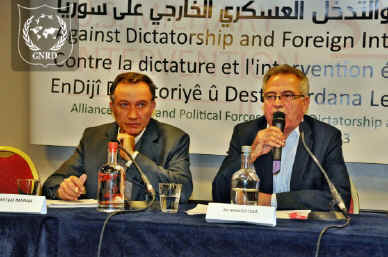
Haytham Manna (left) and Khaled Issa of the PYD at GNRD's conference "Against Dictatorship and Foreign Intervention in Syria" in 2013.
GNRD and Syria
Links with Haytham Manna and the Kurdish PYD
30 June 2015: In a blog post last week I wrote about the Global Network for Rights and Development (GNRD) and its extensive network of Palestinian connections. Since then, as part of my continuing investigation, I have been looking at GNRD's Syrian connections.
Syria actually gets more attention on GNRD's website than Palestine – there are 112 pages mentioning Syria compared with only 42 pages mentioning Palestine – but its connections with Syria are far more limited. They revolve mainly around Haytham Manna of the National Coordination Body for Democratic Change (NCB) and a Kurdish organisation, the Democratic Union Party (PYD).
In 2009, a few months after Israel's "Operation Cast Lead" in Gaza, an organisation called the International Coalition Against War Criminals (ICAWC) filed a lawsuit in Norway. It sought to have three Israeli politicians and seven military commanders prosecuted for war crimes.
One of those involved in preparing the lawsuit was GNRD's founder-president, Loai Deeb, a Norwegian citizen of Palestinian origin. At the time of the war crimes lawsuit Deeb was described as ICAWC's Executive Director. Another prominent figure in ICAWC was Haytham Manna, a Syrian who had the title of General Coordinator.
Deeb and Manna were also connected as co-founders of the Scandinavian Institute for Human Rights (SIHR) which aimed to "disseminate the culture of human rights, especially in the Middle East". Deeb left the board of SIHR in 2013 (according to his own account) but he and Manna have continued working together GNRD.
-
Last year, for example, Manna spoke at a GNRD event in Spain about preserving freedom of speech in public broadcasting services.
-
In February this year Manna was moderator for a panel discussion at GNRD's strange counter-terrorism conference in Geneva where, according to GNRD's report of the event, he warned that "we must be wary of NGOs controlled by dictatorial regimes".
-
Last week Manna spoke at a GNRD event held at the UN headquarters in Geneva on the subject of human rights and counter-terrorism.
In September 2013, GNRD also held a conference "in cooperation" with the "Alliance of Civil and Political Forces against Dictatorship and Foreign Intervention in Syria". The conference, entitled "Against Dictatorship and Foreign Intervention in Syria" and held in Brussels, was publicised in a GNRD press release, though GNRD's report of the event has joined a growing number of pages deleted from its website. However, a series of videos from the conference can be found on YouTube and there's also an account on a Kurdish website which lists the main speakers:
-
Anne-Marie Lizin, GNRD's "High Commissioner" for Europe
-
Haytham Manna, spokesperson of the Arab Commission for Human Rights
-
Loai Deeb, president of GNRD
-
Khaled Issa, Kurdish Democratic Union Party (PYD)
Haytham Manna is a leftist Syrian dissident of long standing. He was spokesperson for the Arab Commission for Human Rights but reportedly left it in 2011 to become a founder of the Syrian National Coordination Body for Democratic Change (NCB).
Describing Manna, Aron Lund of the Syria in Crisis website says he became a polarising figure in the Syrian opposition:
"Some dissidents viewed him as too lenient toward the government of President Bashar al-Assad and as an alliance wrecker who combated pro-US and Islamist dissidents more fervently than he fought the government itself. Others appreciated his hard-line secularism and anti-interventionist policies, as well as his insistence that elements of the regime must also be involved in any transition."
Within the NCB, Syrian Kurds are represented by the Democratic Union Party (PYD).
Failed mission to Syria
In June last year, GNRD sent a delegation to Syria "to document the humanitarian situation in the Kurdish province of Syria (Rojava) with emphasize [sic] on human rights and crimes of war".
This mission, it said, was "based on invitations from the Supreme Kurdish Committee and from the People’s Council for Western Kurdistan" – two bodies connected to the PYD. A news report of the trip on GNRD's website also talks of meeting a PYD representative, Mohammad Resho.
The delegation consisted of three Norwegian lawyers, an interpreter and a photographer. All three lawyers – Kjell Brygfjeld, Bent Endresen and Pål Hadler – had previously been involved in ICAWC's attempt to prosecute Israelis for war crimes. Brygfjeld is now representing Loai Deeb in a Norwegian money-laundering case. Endresen works for the same law firm as Brygfjeld.
The trip to Syria seems to have been a costly failure, mainly due to travel difficulties. A five-page report on GNRD's website explains that the team were unable to reach their intended destination and decided to return to Norway.
The report did, however, make recommendations to the UN and the Norwegian government. In particular, it urged the Norwegian authorities to focus on the situation of Kurdish refugees in Northern Iraq and "very quickly survey what these refugees need in order for them to meet with harsh winter conditions".
A visit to Erbil with the PYD
This year, early in April, Anne-Marie Lizin, the discredited Belgian politician who serves as GNRD's "High Commissioner for Europe" visited the PYD office in Brussels for a meeting with Asya Abdullah, PYD's co-chair. They discussed "the plight of Kurdish women and the ongoing fight against religious extremism" according to a news item on GNRD's website:
"All parties agreed that greater attention to the role of women was key to finding a lasting solution in Syria. Mrs Lizin emphasised GNRD’s interest in surveying the region’s needs and meeting with Kurdish parliamentarians in both Qamishli and in Erbil on the Iraqi side of the Kurdish region."
Less than two weeks later, a GNRD "team of five specialists" headed by Lizin arrived in Erbil. The other four were PYD member Rhodi Mellek; Amir Forotan, a journalist who had previously worked with GNRD and its sister organisation, IIPJHR; Léonard Fisch, a photographer; and Robert Pingeon, a consultant. (Assuming this is Pingeon's profile on LinkedIn, he runs a consultancy "specialising in business opportunities in Iraq and the Middle East" along with "NGO consulting on refugee issues".)
The team were said to have spent five days in Erbil "completing field research, interviews and meetings". GNRD does not seem to have posted a detailed report of their findings on its website but has presented it at a couple of gatherings in Brussels and Geneva.
In Brussels earlier this month, GNRD hosted a business lunch for "decision-makers" attending the Crans Montana Forum. Lizin spoke about "GNRD’s latest work on women’s rights" and then introduced PYD member Mellek who "presented GNRD’s mission report on women’s rights situation in the areas and emphasised the plight of Syrian refugees".
Mellek and journalist Forotan also presented the report during a GNRD event at UN headquarters in Geneva last week. Interestingly, the account on GNRD's website makes no mention of the PYD or Mellek's connection with it. Instead, she is described as "Head of the European Kurdish television for Rojava".
GNRD, of course, is entitled to work with the PYD if it chooses, but such a close relationship with one Kurdish faction does raise questions about its claim to be "neutral and impartial".
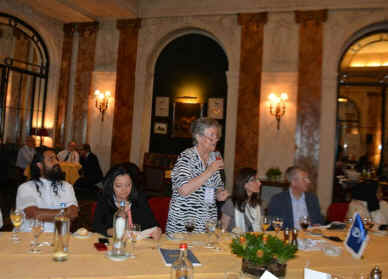
GNRD "High Commissioner" Anne-Marie Lizin addressing the Crans Montana Forum in Brussels.
Online harassment resumes
Smear campaign linked to GNRD investigation
1 July 2015: Several Facebook pages have appeared during the last few days which seem to have the sole purpose of making defamatory allegations about me. These include claims that I am paid by Qatar to write nice things about it, that I am spying for Qatar and that I was fired from the Guardian for passing sensitive information to Qatar.
The smears are an apparent reprisal for my investigation into the Global Network for Rights and Development (GNRD), a strange NGO-like organisation with Emirati connections that Norwegian police suspect of money-laundering.
The allegations about me are basically the same ones that were circulated during an earlier smear campaign in February and March (see blog posts here, here, here, and here).
The previous harassment campaign was clearly coming from supporters of GNRD. It circulated smears on Twitter using fake accounts which were also being used at the same time to promote the activities of GNRD's founder-president, Loai Deeb.
So far, the current campaign mostly involves setting up fake Facebook accounts which attempt to befriend my Facebook friends and then post a variety of defamatory graphics, like these:
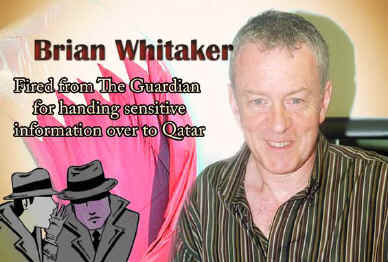

Overnight, there was an attempt to hack my own Facebook account, plus 11 attempts to re-set my Twitter password. I have also begun receiving emails thanking me for subscribing to various websites that I haven't subscribed to. These things all happened during the previous harassment campaign too.
The smears posted on social media appear to be the basis for a statement in GNRD's latest press release which says that I am "alleged to act under direct instructions from Doha, Qatar".
Needless to say, this is untrue. I have no particular connection with Qatar. I have been there only twice, most recently in 2006. On both occasions I was reporting for the Guardian and the Guardian paid all my expenses. I have never received any money from the Qatari government or anyone else in Qatar.
I have also had no assistance from Qatar in connection with my investigation of GNRD, though I have had a lot of assistance from Google. As readers can see, my articles are based almost entirely on open sources which anyone can check for themselves on the internet.
Meanwhile, my Facebook friend Khaled Diab reports what seems to be a new harassment tactic. He received the following message:
"You are a friend on the social networking site Facebook friend with Jewish Zionist Brtani Called Brian Whitaker Can I ask why you are an Arab and Muslim
This inducible Brian Whitaker and gay and powered by Qatar and Israel
This man incites religious and ethical matters in the Islamic Arab societies and receives financial support from Israel for sedition and corruption on all media sites that can be up for it and friendly site on the Internet and an account on Twitter and unfortunately I do not know how to be a friend you have on the social reach all kinds of sites
It also calls for the establishment of associations gay Arab world and so is dangerous"
This reference to "dangerous" gay organisations prompted me to check on GNRD's activities in the field of gay rights. Among the 2,500-or-so pages on its website, I found just three containing the word "gay". Two of these refer to people who have "Gay" as a surname or first name.
The only other mention is a passing reference in a speech by Navi Pillai, the UN human rights chief, which GNRD posted on its website.
A GNRD supporter at the UN Human Rights Council accused Norway's public prosecutor of racism
Nobbled by Qatar?
GNRD questions Norway's motives over police raid
2 July 2015: In recent statements the Global Network for Rights and Development (GNRD) has portrayed itself as an organisation struggling to "forge a genuine international will to combat terrorism" – in the face of obstruction and opposition from Norway.
Referring to the Norwegian police investigation into suspected money-laundering, GNRD says most of the material seized during the raid on its offices last May has been returned but documents relating to its "counter-terrorism" efforts have not:
"Økokrim [the Norwegian economic crimes agency] returned the most papers and computers it seized ... but retained several documents the most important of them being GNRD’s correspondence with countries on its proposed convention on balancing human rights and counter-terrorism measures, and most of the documents related to this project."
GNRD asks: "What is the relationship between the convention on counter-terrorism and money laundering, if this was the aim of the raid?"
This is a very good question, though GNRD seems to be asking it rhetorically, implying there is no connection. Instead, it has made two alternative suggestions about the reasons for the raid.
One is racism. A GNRD statement read out by one of its supporters at the UN Human Rights Council said the raid may be "linked to the non-Norwegian origin of the GNRD President, Dr Loai Deeb, and other members of GNRD management".
Deeb is of Palestinian origin, and the speaker continued: "At the social network page of the public prosecutor … an unprovoked attack on the citizens of Gaza and the Palestinians was found."
Unfortunately the speaker gave no further details about this. The reference to the public prosecutor can be heard in a video of the speech posted on GNRD's website (at 1 min 32 sec) but does not appear in a text version of the speech below it.
GNRD's other suggestion is that the police raid could have been instigated by Qatar:
"Does a privilege [sic] and active position of Norway at the 13th UN Congress on Crime Prevention and Criminal Justice held in Doha, Qatar have any connections to the raid at GNRD or the roots of the attack are coming from there?"
The congress in Doha took place between 12 and 19 April, and according to GNRD Norwegian authorities took their first steps to obtain a search warrant for GNRD's premises shortly afterwards, on May 7.
It is unclear what GNRD is alluding to when it says Norway had a privileged and active position at the congress. It was one of 149 countries attending and one of more than 70 countries that made a "high level" statement.
In its statement to the congress, Norway explained that because of its opposition to capital punishment "we have limitations in our national law as to how far we can cooperate in the justice area with countries practising capital punishment". It also referred to transnational crime as "a defining issue of this century for all our countries".
GNRD portrays the continuing retention of its counter-terrorism documents as part of broader opposition by Norway to its efforts in this area, citing Norway's "refusal to participate" in the counter-terrorism conference that it organised in Geneva last February.
There are many unanswered questions about the Geneva conference. It's clear that GNRD attached great importance to it and that it served some kind of political agenda (though whose agenda we don't yet know). It was almost certainly the biggest and most expensive event organised by GNRD and, according to Deeb, took almost two years to prepare. The preparations (again, according to Deeb) involved sending "thousands of field researchers around the world" to compile information about terrorism.
(It may or may not be relevant that the month-long campaign of online harassment directed against me during February and March began just a few days after I wrote my first sceptical blog post about the conference on February 9.)
In recent statements, GNRD presents the conference as an uncontentious affair – the sort of thing Norway could not reasonably oppose. Referring to the conference in its latest press release, for example, it says Deeb "put forward a new agreement for collective cooperation in the fight against terrorism that seeks to develop effective international coordination mechanisms":
"In his speech to the participants, Dr Deeb called on all states to support the proposed Convention in order to work collectively to develop new strategies to prevent terrorist attacks all over the world by various armed groups, and to take punitive action against their supporters."
However, GNRD has been oddly coy about the nature of the counter-terror mechanism it proposed. There's no detailed explanation on its website and the draft convention it presented at the February conference hasn't been posted on its website either (though a leaked copy can be read here).
The centrepiece of GNRD's plan is to set up an International Council for Counterterrorism, closely modelled on the Human Rights Council – one of the UN's most ineffectual bodies. I discussed possible political motives behind this plan in an earlier blog post; one effect is that it could help some governments to designate local opposition movements as terrorists without necessarily producing solid evidence of terrorism.
But, to return to GNRD's important question: Is there any conceivable connection between the counter-terrorism conference and money laundering?
The answer depends largely on how it was funded, and by whom. So far, GNRD has not been very forthcoming about that. There have been repeated claims that Mohammed Dahlan, the corrupt former head of Palestinian "preventive security" in Gaza, provided at least some of the funds. Up to now, GNRD has made no public comment on those claims. If the Norwegian authorities find evidence of funding by Dahlan they might then be in a position to argue that GNRD was benefiting from the proceeds of crime.
GNRD supporters demonstrating outside UN headquarters in Geneva on Monday
GNRD and homophobia
Anti-gay campaign by 'rights group' supporters
3 July 2015: Considering that the Global Network for Rights and Development (GNRD) claims to be a human rights NGO, it has some very strange supporters.
The latest move in the campaign to defend GNRD against its critics is a fake page on Facebook called "Brian Whitaker Gay Community". It's decorated with a Photoshopped picture of me in Arab dress in front of a Qatari flag, plus various pictures of naked men, including these:


In a previous smear campaign on GNRD's behalf, in February and March this year, a made-up story was circulated on the internet claiming that I had sexual "adventures" in Yemen during the uprising against President Saleh. (As my passport shows, I wasn't even there at the time.)
This sort of campaigning may go down well in the United Arab Emirates – the country where most of GNRD's funds are said to come from – but is unlikely to find favour in Norway, where GNRD is based and where it is currently being investigated for suspected money laundering.
It's time for GNRD to make clear where it stands. Does it support homophobic campaigning or not?
Although GNRD says it opposes racial discrimination and "devotes its great efforts to protect and promote women’s rights around the globe", it appears to have been totally silent on issues surrounding sexual orientation and gender identity.
A search for "LGBT" among the 2,500 pages on its website draws a complete blank. A search for "gay" finds three mentions. Two of these are people who have "Gay" as their surname. The other mention is a reference to "discrimination against lesbian, gay, bisexual, transgender and intersex persons" in a 2013 speech by Navi Pillai, the UN human rights chief, which GNRD posted on its website.
On Monday, GNRD supporters held a demonstration in front of the UN's Geneva headquarters, protesting against police raids at its Norwegian office and at the home of its founder-president, Loai Deeb. A tweet posted by GNRD described the raids as a "first step from democracy to totalitarianism" in Norway:
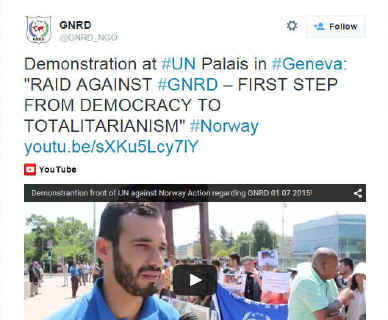
A GNRD video of the demonstration (at 4min 12 sec) shows one protester hesitantly reading out a prepared statement about me. Here is my transcript of the statement:
"First of all I would like to address the social worker (?!) Brian Whitaker who constantly posted in al-bab website aggressive articles against GNRD and its staff. It is really look like he has a order from someone and probably a big power against GNRD to publish in response to any GNRD activity an aggressive post.
"If you read all these posts you understand there is no logic between them. They even contradict each other. It is coming increasingly clear that the Brian Whitaker is paid from a hired hand for some power and I hope the Guardian, a respected newspaper which from time to time publish his articles on different topics, will check the information I have just shared.
"Maybe other publications of Brian are also made to order and paid for by powers and prefer to use them as a front rather than come out openly themselves."
Suspect rights group buys support
Thousands spent on bogus social media activity
14 July 2015: Following police raids at its headquarters and at the home of its founder-president, the Norwegian-based Global Network for Rights and Development (GNRD) is trying to create the impression that a large-scale international campaign is under way, rallying to its support.
Although GNRD is recognised as a human rights NGO by the United Nations and the European Parliament, Norwegian police suspect that the organisation and its founder, Loai Deeb, were at the centre of a $13 million money-laundering operation.
GNRD has responded to the police raids by claiming it has become a victim of racism and human rights abuse by the Norwegian authorities – even asserting the Norway is headed towards totalitarian rule.
Earlier this month, while the UN Human Rights Council was in session in Geneva, several obscure organisations that GNRD works closely with were allowed to make speeches in its support, condemning Norway's behaviour. There was also a small demonstration in Geneva outside the Palais des Nations.
Now, with the Human Rights Council no longer in session, the focus of the campaign has switched to social media – an area where GNRD already has plenty of experience in creating false impressions.
GNRD has an unbelievable one million Twitter followers and Deeb has an even more incredible 1.81 million. If these followers were real people Deeb would be by far the most popular person in Norway. As Dagens Næringsliv newspaper pointed out recently, Deeb and GNRD appear to have more social media fans than all the Norwegian government ministers and members of parliament combined.
Deeb and GNRD have almost certainly spent tens of thousands of dollars on bogus social media activity. A look at the price list of FastFollowerz, a Las Vegas-based company, gives some idea of the figures.
Purchasing a million fake Twitter followers through FastFollowerz costs $2,999. Fake fans on Facebook are more expensive: 25,000 "likes" cost $1,999 (and GNRD has more than a million of them).
A YouTube video of a speech given by Deeb at a conference last February appears to have been viewed well over a million times (though viewing figures for other speeches from the same conference are negligible by comparison). Buying a million YouTube views from FastFollowerz costs $2,999.
Many of GNRD's tweets are also re-tweeted and favourited by fake accounts, typically between 1,000 and 5,000 times. To take one recent example, this tweet has been retweeted 4,744 times and favourited 3,919 times. According to the FastFollowerz price list (and allowing for some genuine retweets and favourites) that would have cost more than $80. So far this month, GNRD has posted 23 tweets with suspiciously high numbers of retweets and, assuming they were paid for, the total spent on this in just two weeks would be well over $1,000.
ArtHealing44 – a prodigious tweeter
Currently, the GNRD campaign mostly involves posting photographs of people from various countries holding placards declaring their support. In this, it has been getting special assistance from one Twitter account in particular: ArtHealing44.
Over a three-day period (July 10-12), ArtHealing44 posted an astonishing 815 tweets supporting GNRD. Of these, 328 said "Thanks to #Benin #Palestine #Ecuador #Botswana for supporting #GNRD" and 487 said "Thank you #Mauritania #Pakistan #Palestine #SriLanka for supporting GNRD_NGO".
ArtHealing44 is a prodigious Twitter user, having posted more than 76,000 tweets altogether, mostly attacking Israel or supporting Palestine. At one point yesterday afternoon, ArtHealing44 was posting at a rate of 10 tweets per minute.
With the 815 GNRD tweets, ArtHealing44 got around Twitter's rule against posting identical tweets by prefixing each one with the name of another Twitter account (though without the customary @ sign). Random sampling of these other accounts suggests they are fakes, often mis-spelling the names of real accounts.
One of them, for example, purports to be the account of Gordon Donovan, a journalist at Yahoo News. It uses the Twitter name @ogrdonovna, jumbling the letters of what appears to be Donovan's real account, @gordonovan.
Another purports to be the account of Dr Jim Rawson, a radiology expert whose real account is here. Judging by the profile picture on the fake account, whoever created it didn't realise that Jim Rawson is a man.
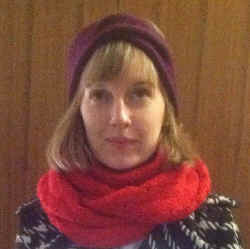
Dr Jim Rawson? Probably not
Incidentally, both these accounts cited by ArtHealing44 have also been used for what appear to be paid-for retweets on GNRD's behalf.
Although ArtHealing44 is probably a fake account (the profile links to an online art gallery which already has its own Twitter account), it differs from most of the others associated with GNRD in that it seems to be in the business of generating new tweets en masse rather than merely retweeting.

 RSS Feed
RSS Feed